Link
0 notes
Photo

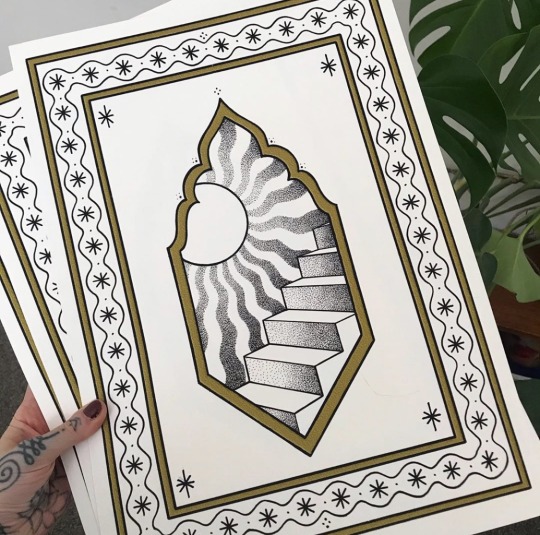


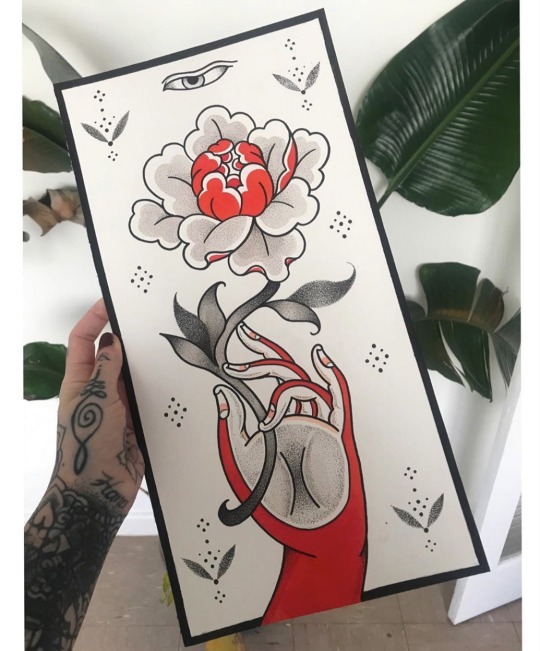
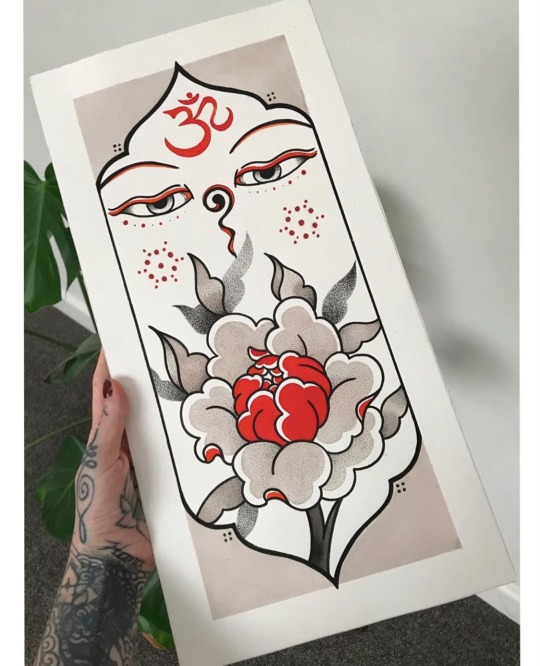
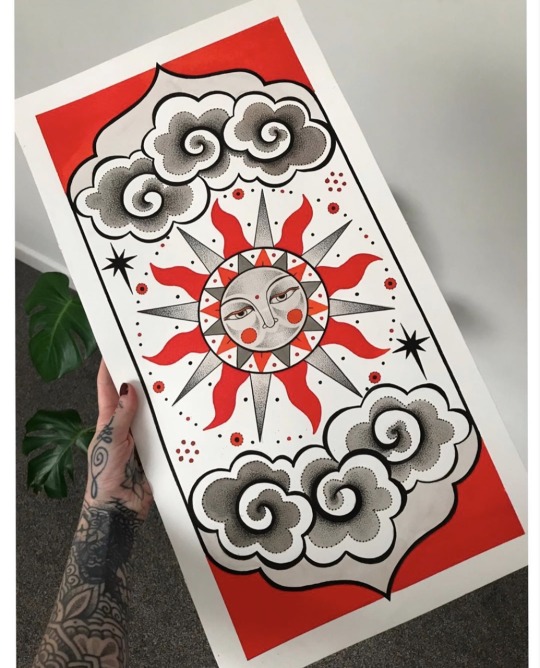
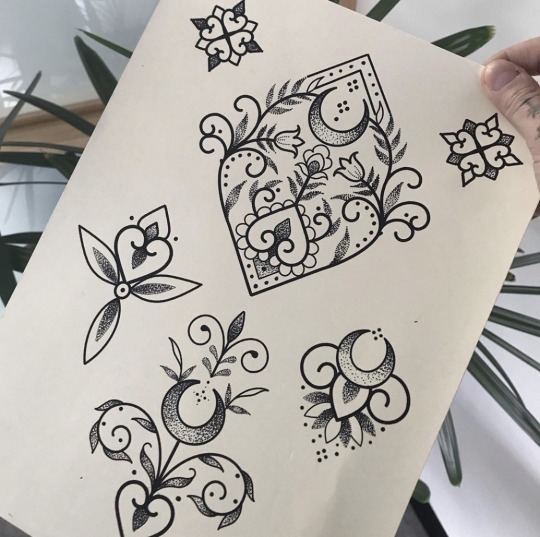
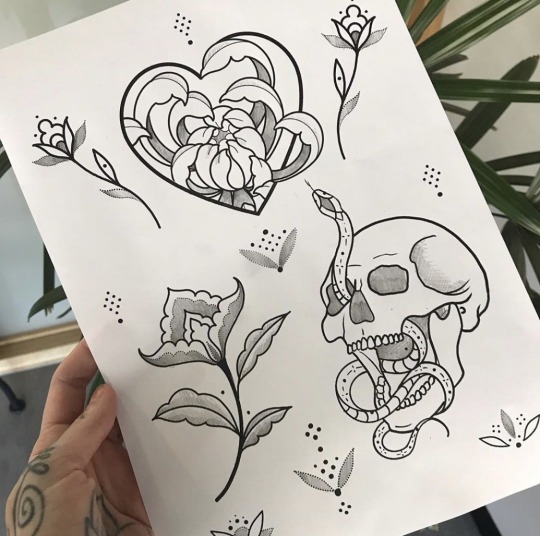
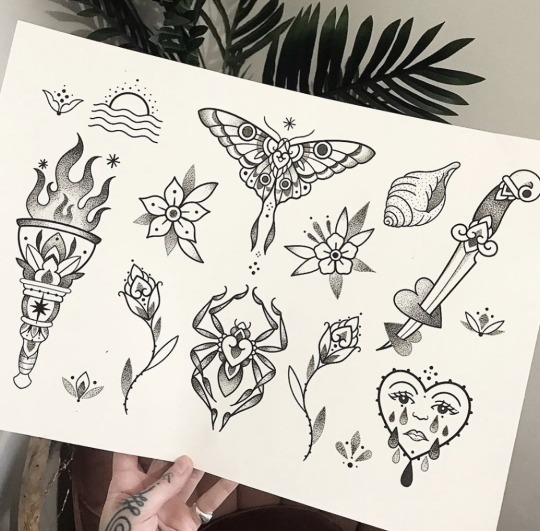
Amy’s Art and Tattoo Flash
Art and Tattoo Flash by the fabulous Amy Jones who I interviewed for the final episode of the first season of the NJAG podcast.
0 notes
Text
Not Just A Girl: Made by Hand
You can listen to the twelfth episode with Amy Jones here. Or you can find this interview on YouTube with English subtitles/closed captions here.
NOT JUST A GIRL: Tattoo Podcast
EPISODE TRANSCRIPT
Season 1, Episode 12: Made by Hand
Eddy: Hello, friends and welcome to Not Just A Girl, your friendly feminist tattoo podcast. I'm Eddy and I'm back to share with you the thoughts and experience as some of my favorite people in tattooing. On the 12th episode and the last of the season, we'll be talking about tattoo conventions, hand poke tattooing, and what we've learned in lockdown.Before we begin, I would like to acknowledge the Aboriginal and Torres Strait Islander people who are the traditional custodians of this land that was stolen and never ceded. I am honored and grateful to be on the ancestral land of the Awabakal people and I pay my respect to their Elders past and present and extend that recognition to their descendants.Today I get to chat to one of my dearest friends, the fabulous and talented Amy Unalome. Amy works at La Flor Sagrada in Melbourne, and does some of the most beautiful and clean ornamental hand poke tattoos I've ever seen. I even have some myself. Um, I met Amy at a convention a few years back and we eventually got to tattoo each other. And I'm super grateful now to call her my friend. Thank you so much for being part of the podcast, Amy. Amy: Oh, my gosh. Thank you for having me. Eddy: So good. Anyway, hand poke tattoos. That's your thing, everyone knows that. Um, how does your style differ from, you know, Tebori or Ta Moko or the more traditional or tribal styles of hand poking?Amy: Um, well, it's, it's like something that people always ask it's like, generally, like, probably a question that I get almost every single day, at least once or twice a day. And it's like, it's funny cause people say like, so like what made you choose like hand poking or what's the difference with poking than like regular tattooing? Um, I feel like, I guess like regular tattooing could mean a lot of different things, but, um, the main thing that, um, I guess what is hand poking in the sense that I do it is, um, It's basically the exact same idea of tattooing with the machine apart from you take that whole element of the machine out of that. Um, so it's just tattooing by hand. You still use the same, um, needles as you would with a machine. Um, same idea, it's just a lot more slowed down. And the motion of like piercing the skin is kind of, it's done by hand in a repetitive motion. Eddy: Yeah. It's definitely less trauma on the skin as well. Like the ones you did on my thumbs, there's absolutely no bleed out or drop out whatsoever and the heal was so easy. Amy: Yeah, I find, um, because the, um, technique is a lot less intense on the skin um, it definitely creates like a lot less inflammation around the tattoo. So there's a lot of, there's a lot of things that kind of go into hand poking, but definitely the method allows like a lot less intense experience.Eddy: Yeah. It's definitely more relaxing. Like when you did the ones on my tragus, I barely like felt it. It was just kind of a really relaxing and soft experience. Amy: Yeah. I really like, I'm really intrigued to know how like, hand poking feels on the face. Cause I'm like, Ooh, I think I'm going to like it. Like, that's something that I want to experience myself, it'd be cool.Eddy: Yeah. Well, what brought you to that style in the first place? Because you did a trad, a normal apprenticeship, but what, what was the choice that like, why did you choose hand poking rather than machine in your apprenticeship? Amy: Um, well, it's kind of strange how it all came about. Like, I don't think I ever sat down for like a moment and was like, I'm going to tattoo and I'm going to tattoo in this way, and this is the way I'm going to do it. It kind of will happen like quite organically and almost as if like how it was meant to be, um, like me and hand poking always kind of like went hand in hand. Um, Like my first ever experience of it, it's actually like really funny. Um, I was like eight teen, um, and I was hanging out at like a friend's house and we were like, we're punks, lets pierce each other, let's get these safety pins and put them through our noses.And I met one of my friends. She was like, um, Oh, I um I've tattooed myself the other day. Like, do you want me to show you how it's done and I was like, hell yes, I do. Like, that sounds so bad ass. And, um, there was something so cool about a friend of mine, like being able to like mark me in such a simple way, you know? Um, so from then on really like, She did one on me and then I did one on myself and we had like ciggies in our mouths and we were like swigging whiskey at the same time...I love this. Really from then on it just kind of stuck with me. It was something that I was always kind of like, not from a sense that I don't want to go and get tattooed by machine because I did that a lot anyway, like a loved getting tattooed when I was younger, but this was like, I guess it was my way of like, being able to like literally use my hands and use some other equipment and like, tattoo that way.And, um, I guess like the journey that led me to Australia and like led me to Melbourne. And kind of like put me where I was in a place to kind of do an apprenticeship. It was all surrounded around hand poking. And, um, I remember before I even like, thought about getting an apprenticeship, I didn't even think that hand poking was something people did professionally. I thought there was, tattooing and there was traditional tribal tattooing and I just did not think that anyone would ever take like stick and poke um, seriously enough to for it to be a thing. Eddy: Yeah. Cause I guess it was really seen as just a part of like the punk community or, you know, more what's the word like? Not mainstream. Amy: Yeah, it was kind of like anti-establishment like prison tattoo, DIY stick n poke, spiritual, maybe like. I mean, I don't know. Maybe if I just didn't realize that at the time, but it, when I kind of started professionally, like it wasn't really around as much I was aware of in like Melbourne at the time.Eddy: Yeah. Well, you were the first person I'd heard of who was a professional tattooer, who did their tattoos with like by hand rather than by machine. Like everyone else I was aware of in Australia anyway, only talking about Australia here, like everyone else that I was aware of who was doing stick and poke was doing it at home and hadn't ever done an actual apprenticeship. Amy: Yeah, well, don't get me wrong. Like obviously, like my, my story kind of comes from that place of like, you know, I found hand poking in a, in a world that wasn't professional. Um, and obviously, like, I kind of experimented with that on myself, not in a professional environment. Um, and it wasn't until kind of like, Became aware to me like that. Um, there was a few artists in England, um, and Europe and some in America that I kind of started noticing like, Whoa, these people, uh, um, hand poking and they're doing it professionally, and they're doing it out of a studio. They're like, Holy crap, this is something that like, can be done. You know. Eddy: Like Gary Burns, like so amazing. Amy: Yeah. And like, you know, Grace, like Grace Neutral, she was probably one of the first, um, hand poke tattooist in a professional environment that I really kind of like followed that career and their work and was like looking at her go, like it's cool. People can do it. Eddy: Yeah and there's been a lot of like, discussion about what a professional tattooer means like, do you have to have done a certain kind of apprenticeship or, you know, can you just be mentored or can you just decide to do it? And like what, where do you stand on that? Amy: That's, that's always been like a kind of issue that's surrounded me. Um, I was fortunate enough that when I decided that hand poking tattooing in general was something that I, I wanted to do professionally. There was no other choice to me than to search out a traditional apprenticeship. And for me, the only way to, to be able to work within a studio environment was to approach in that way and kind of like ask around and look for a professional apprenticeship. Mainly with the idea that I would, um, be tattooing with machine. So, um, it wasn't until I decided that that was something that I wanted to do. I started looking around for apprenticeships and like, don't get me wrong, it is not easy. You don't just fall into it, especially when you're telling people in professional shops that like, yeah, I really want to do um hand poke like, I'd prefer to really concentrate on that rather than, um, move to machine. Like a lot of people told me to like F off. Eddy: It took me like four years to get an apprenticeship. Amy: Yeah. It's not easy. And, and like this, I guess. This is the kind of like the wall that I hit is that I, because that's the way that I entered the tattoo industry and I did do a formal apprenticeship and I was really fortunate enough to, um, work with tattooers that, um, gave like gave time to me and showed me things that, you know, that they would kind of show me everything they know about tattooing and then kind of helped me almost like turn that into, like, how am I getting use to hand poke? Like no one actually physically sat me down and showed me how to like, do a hand poke tattoo. Um, but I guess it's, it's hard because like hand poke and stick n poke tattooing is something that kind of is associated more with a free vibe, you know, like do it at home.Um, maybe you might not think that you do do like a traditional apprenticeship in that sense, but I kind of entered the industry surrounded by a very old school mentality and a very kind of, if you want to be in the industry, this is the way that you get at that. And not only from like a perspective of like learning how to tattoo properly, but like learning how to tattoo safely, um, which is really important to me. But like, I honestly think in the past I've had like, quite straightforward views about that and I kind of really want to acknowledge that, like, there's not one way to do an apprenticeship.Eddy: Absolutely.Amy: And people learn in different ways. I think the old school apprenticeship in the sense that, you know, The ones that we might've experienced. Um, it's definitely a lot different nowadays and creating like a safe and, um, like nice environment to learn how to tattoo in is very important. But I also think it's still super important to do it in a, um, in a studio environment, because that way you'll really learn how to do it safely. But, um, yeah, I know a lot of people have entered the industry life without the traditional kind of sense of it, but I guess, yeah. I mean, I don't know any other way. Eddy: Yeah. Yeah. I feel like it's more prevalent in hand poking to people to just start at home and then suddenly get a job in the studio without having had that training and real understanding of the techniques they're using, um, you know, blood pathogen training, just understanding how to work with clients. And, you know, some of these people might be incredibly talented and bring a lot to tattooing, but it's also detrimental in some ways to the customer, because when you work at a professional studio, the customer assumes that you have had professional training and yeah, I'm the same. Like I used to be very staunch on my views of there's only one way to answer tattooing and it's this way. And I've changed my mind on that a lot and opened it up to understanding that there are many ways you can enter tattooing, but at the same time, I think you do still need a mentor. Someone who is a professional tattooer. To show you whether it be in a formal or informal capacity, how to tattoo, how to understand the skin, different techniques and mostly client safety.Amy: Absolutely. Like there's not been kind of like one person in particular that's been responsible for showing me and teaching me like studio and shop etiquette and, um, safe practice. Um, I've picked that up from working at a few different places with so many different people. And like, I think in the tattoo community we're fortunate enough to share information with each other and support each other and make suggestions. Eddy: Yeah. Amy: I think without that, that's when you really fall into like some kind of trouble, because maybe you assume that, you know what you're doing and without that kind of peer support in a safe environment, um, you can be making mistakes that you didn't even know exist.Eddy: Exactly. Amy: You know so I would have conversations with clients that had been like oh, you know, like, Oh, I got this done um, by a professional, you know, it was clean and it don't worry it was really safe. And it's like, well, like um first and foremost I'm glad that the client felt safe and happy to do so, but at the same part, and like, you know, you as a tattooist you can kind of like see things in their tattoo that they're talking about and you're like, You know, you hear about how the setup was and you see the way that the tattoo has been done. And you know, it, wasn't done by a person with professional training, but that's not important to some people, I guess it's always been important to me. Eddy: Yeah, same. And I think for me, as soon as someone takes money for that service, that's when it crosses the line, like. You know, I mean, we've all done things that we shouldn't have done when we started out, you know, we've all had rocky backgrounds or whatever, especially, you know, kind of 10, 20 years ago, people coming into it it was a very different world. Yeah, if client's safety and, and people's health, isn't our first priority we really need to rethink whether we're in it for the right reasons as well, because it's a huge responsibility. And, you know, there's a huge difference between somebody tattooing themselves at home for fun and them taking money and taking clients and pretending they know what they're doing. Amy: Yeah. And I think that's why we kind of like run into trouble sometimes with the idea of what hand poke tattooing is. Um, it's also like referred to a lot of the time is, um, stick n poke, which also, you know, like upon like searching the internet, what that might mean. It definitely means a lot to different people. Um, I mean, like, I don't want to be the one that kind of says what hand poke or what stick and poke tattoo is. It's like, some people love the element that it's like unregulated and, um, it's kind of got a little bit more freedom in it because you either have to, um, stick to the kind of guidelines of machine tattooing. Um, but for me kind of, as soon as I decided that it was going to be something that I provide to the public and to clients it's really important always and it always has been for me to be able to do it properly, I guess. Like, I guess like what's the proper way to do it, but I, yeah, I mean, I, I've kind of been like raised up through this kind of very professional, um, surroundings in the industry and, and maybe it's sometimes been to my detriment, like.There's this like a sense of like a hand poke community, um, and also a tattoo community. And I've never really liked found a place in between the two. I don't feel like I've ever really been accepted into one or the other and I guess like that I can say the same if I'm trying to say like what's professional and what's not like, I'm kind of like, I dunno. I feel like it's a bit more fluid than this being like... Eddy: Yeah. Yeah. And it must be hard kind of being between the two worlds, like, you know, tattooers who use machines being like, you're not a real tattooer cause you don't use machines. Even though we only started using machines when electricity came along and then like, yeah, the hand poke community saying, Oh, you work in a shop, you call yourself professional. You're not, you know, DIY enough for us, it's really, that's a hard balance. Amy: I've always felt like, especially, um, when I started tattooing professionally, there was really like very, very few other like professional hand poke artists that I knew of in Australia. So it was always hard, um, kind of feeling, um, like always felt like a bit of an outsider. Like I wasn't kind of included in the tattoo community cause you know, everybody in the shop would be talking about like techniques of machine or, you know, there's Amy, she's just doin her silly little hand pokes, like when you're going to pick a machine up, you know? And then when hand poke started becoming really popular, um, I was kind of taught by my peers to like kind of rage out against that because they hadn't done professional apprenticeships like I had. So that then segregated me from the hand poked community, um, which I kind of longed for the whole time that I've been tattooing, um, and it hasn't really been until the last few years when I've met um, a lot of tattoo is, um, like yourself. And when I kind of got involved with Not Just A Girl that I was like, Oh, Whoa, okay. Like, Now tattooers are kind of excepting me, but I'm still not accepted in, I don't know. I've always kind of been a bit of a floater in that sense, but. Eddy: Yeah, that's so typical.Amy: Definitely. Eddy: OhAmy: Sorry. Eddy: I was going to say that's so typical of that toxic side of tattooing that we create cliques and then we set them against each other. It's just. Like, I remember working in a studio in Newcastle where it wasn't particularly pleasant, but I remember when I was trying to reach out to other artists, they were like, why, why would you talk to them? They are your competition. You should hate them. And you see that recurring in tattooing, like, you know, Oh, girls can't work together because they're too much drama. They don't get along. They'll hate each other. And then, yeah, like machine tattooers against hand pokers and there's a lot of hate. Amy: I had a, I had a client, um, come to me months and months ago. And they told me that that walked into like a local shop. And, you know, just to have a look, do have a walk in maybe, fun little tattoo and they'd had a hand poke tattoo by me previously. And they said to the receptionist, like, Oh, do you have any hand poke artists here? Like, I've had one of those before and I really liked another one. And they replied with, we don't acknowledge that as a professional form of tattooing. So no, we don't do it at this shop. And I was just like, man, that sucks. Because like I put so much time and energy into kind of like creating that professional element to what I do that is like, Oh, okay. Everyone's not keen on it yet. That's okay. Eddy: How can you not recognize something that's a part of your own history? Amy: Yeah. I mean, I like, I have no idea who the person was that said that, I was like, Oh, okay, well come and get one from me again. I guess like, yeah. Eddy: That's so mad to me. Like all tattooing in every single culture has started as a hand poke form of tattooing. Amy: Yeah. I mean, this is it's again, it's kind of like that divide between like, what is what, and I don't think that we need, like, we need to really kind of label it like that. Like, I don't think that like, machine tattooers should label hand poke as non-professional. But I also think that like maybe professional hand poke tattooers should not label like stick n poke as, you know, like. I mean, like, as long as somebody's doing it in a studio, like in a safe environment and they've taken the time to kind of, um, educate themselves with safe practice and you know, it's all healthy. Um, so like, who am I to say? What is, and what isn't, what should be, and I can't get mad when other people say the same about me, but I think I've been super lucky in that, like I've managed to work with a lot of people that do acknowledge what I do and do, um, make me feel very welcome, um, in tattooing now and like to the point where like, even tattooers want to get tattoos from me, like that means the world that like that's kind of like being accepted that my work is like, okay. Eddy: That's the best feeling when a tattooer books in with you.Amy: It's so excited about it, but at the same time, I'm like F off I'm too nervous, so scary. Like when you asked to get tattooed by me, I was like heart attack city like, just can't deal with it. But somehow I managed to get through.Eddy: Yeah. It's one of those things where you have like, have a little bit of a panic attack in the bathroom beforehand. I dunno, you come at it shaking like, Oh my God, I hope I settle down before I finished this tattoo. Amy: Literally, like before I tattoo anyone I have to have like a little like pow wow in the, like toilet, like, yeah, I've got this. I remember, like my apprenticeship, every time the door opened, I would run to the toilet. So everybody thought that I had like some kind of like toilet problem. Cause that's just like my safe place. It's just, I don't know, those ones that are the scariest ones are the ones that I seem to just like, something just comes over you and you can just do it. Eddy: Yep. Amy: I don't know. Eddy: Fight or flight. Amy: Yeah, man. Yeah. Eddy: Yeah. Talking about being nervous tattooing, you have done so many conventions and I I'm always a nervous wreck at conventions, but I mean, you've you're like old hat at it now?Amy: I, um, I was really, really fortunate in that my first like four years of tattooing. Um, it was very heavily concentrated on the, um, convention circuit, um, not only in Australia, but I was really, really lucky to be able to travel, um, worldwide, to do them and like, don't get me wrong. I still get so nervous, like social anxiety to the max. Um, but the, I think the more you do, the more you kind of like realize that, um, everyone's in the same boat. Um, and you can kind of like drown out the, um, the craziness and the noise around you because you still have these like really awesome intimate connections of each person that like, kind of walks up to your booth so. I still get nervous, but it does get easier. Eddy: It's such a weird experience. Like, you know, doing this thing, you usually do every day, but having hundreds of people walking past just watching you it's yeah. It's, why do we do it? Amy: I don't know. It's crazy too cause I remember going to a convention before I was a tattooer and walking around and I was looking at all these artists being like, Whoa, like this is so cool. Like, can you imagine being able to do this one day? So, I think every convention that I do now, I have like a moment of gratitude being like, man, I'm like, I'm so like stoked that I'm like, yeah. And this is where I wanted to be. Um, it's yeah, it's really, it's cool. It's definitely a perk of my job for sure. Eddy: Yeah. I think the best bit of conventions is just the socializing with other tattooers and the friends you make. Like you, I met you at a convention and now you're one of my best friends and yeah. It's you can make some really amazing connections there. Amy: Yeah. I mean like a lot of the time, the things that I say to other people at conventions and like, did I just like, I went to like shake their hand and high five them at the same time. And I was like, woooo hey. Get like, so like doofussy and these like, um, interections especially with tattoo artists that I admire and look up to I'm literally like a jibbering like mess, like probably saying dumb stuff when we met. But, um, that it's certain conventions that I've been to the effort that other tattooers make to make connections with you is just like, it's so cool. And I've yeah. Um, a really great thing about it is meeting the artists, especially, um, within like our female community. Like we're always checking in with each other at conventions. It's really cute. Eddy: It is. Yeah. I know what you mean by going goofy though. Like my husband says that whenever, he can see me talking to like another tattooer at the convention that I've got, like T-Rex arms happening where I'm like holding my hands up to my chest because I'm so nervous and don't know what to do with them.Amy: I dont know what you're talking about. Literally, I, my biggest thing is I would walk around with this like kind of Stepford wives smile on my face. Like, Hello, nice to meet you. What are you doing? Have you been busy?Eddy: It's like the same three questions too. Amy: Always on repeat, like all weekend. Um, it's so cool because then like the way that conventions are set up and each person has their own booth to kind of, um, Show their own self in that small area. It really like sparks conversation between you and other artists and you buy prints, you buy like merchandise. Yeah. It really kind of like helps you bond really quickly especially because at conventions people are like what are you doing? What is that? Where's your machine? Is that all you packed? You just packed those few things, what the F.Eddy: You have like the smallest convention bag ever. Amy: I do. Um, it's a very fortunate thing about hand poking is that I do not carry a lot of equipment, so it's very good for traveling. Eddy: You can easily, you get through customs.Amy: This is true. Paddlepop sticks? Chopsticks? Yes.Eddy: Yeah, well we have a few conventions hopefully planned for like ourselves and you know, we've already been planning how we're going to deck our booth to be all amazing if these conventions ever happen. Amy: I know. I mean like travel is a bit of a strange thing right now, but um definitely the kind of the conventions that I want to attend they're everywhere they're all around the world. And it's just, um, that kind of, I didn't realize how lucky that we had it when we had the ability to travel as much as we did these really, really, really great conventions put on by really great people. Um, I look forward to when we can do them again. Eddy: What, what have been your favorite convention so far?Amy: Oh man. Um, I would say experience wise, um, I was really lucky to attend the, um, the first ever, um, South African Tattoo convention. Um, and what was incredible about that was, um, the, the organizers, um, It was kind of more like family run. Um, the, the organizers, putting so much work to kind of have all of these international artists come together in such a magical place, but also make us feel so welcome and, um, really showcase their country and their culture to us and help us bond and put on this. It was just such an incredible time. Um, there was so many cool tattooers there and we got to do some cool stuff. Um, so the, the kind of close connection, of that one was really fabulous. Um, the same for this one that I attend often which is the, um, the New Zealand Tattoo convention. Again, just like run by people that really care about tattooing, really care about not only making the artist comfortable, but they really, really like include the public and in what happens. And, um, just to get just the general vibe is more like, everyone's welcome. Let's all be friends. Let's hang out. It's so fun. Eddy: It's so lovely at the New Zealand one, how they paid tribute to, um, Like the local customs and traditions by putting on the like welcome to country. I don't know what, like haka, is it Amy: The haka? Yeah.Eddy: Yeah. Yeah its so beautiful.Amy: Their traditional welcome. It's, yeah. And it's totally respectful of, um, the, the town and the country that it's held in. And um, Having like so many artists come from around the world, um, and the whole, it's a small town and everyone's so welcoming, they're so keen to show you about their like history and their country. It's so fab. It's really cool. Eddy: It's awesome. I can't wait till the next one. And I think the thing I love about it is, you know, And, and that it's a huge difference between the Australian conventions and the New Zealand or other international ones that I've seen, like where it is actually focused on tattoo art specifically. And they don't use women's bodies to sell their merchandise. You know, we're not objectified and you know, in Australia, it's very, very disappointing. How, you know, from my personal experience, how I've been treated at conventions. Amy: Yeah. I mean, it's a shame. Um, I think it has been acknowledged in the past that maybe some of the, um, kind of entertainment and advertising aspects of Australian conventions might have been a little bit more, um, concentrated on, um, exploitation of, um, women's bodies and sexuality in tattooing. And I think a lot of female tattooists had kind of spoken up about maybe like, you know, in advertisements, maybe show us tattooing rather than walking a catwalk. But, um, you know, I definitely understand that you need to provide a certain element of entertainment maybe for the general public come into a tattoo show, but I think it's also really important that it's all inclusive in that sense and the entertainment isn't more of like a physical representation of what tattooing is, and more kind of like let's include everybody and make it about the art. Eddy: Yeah, absolutely. And you know, it's advertised as a family friendly event, make it family friendly, like, you know, instead of, you know, burlesque, and now I have absolutely no problem with burlesque, pole dancers, anything like that. I absolutely love that stuff, but I also love it in the correct venue, you know, at lunchtime, at a family friendly event, a little child's not going to understand what they're seeing and you know, that removes the parents' ability to censor what their children are seeing and, you know, introduce them to it at an appropriate time. And. Yeah, that and the way that they went about it, like my last convention, you know, I was hearing things like her tits are gonna set you on fire over the loudspeaker. And I'm just like, I'm a, I'm a woman and I'm sitting here trying to do a tattoo and I'm hearing stuff like that and that makes me feel unsafe and uncomfortable. And you know, when I've gone to Literary Ink or New Zealand, for example, I haven't had that at all. I feel very much just another tattooer. You know, I'm not separate at all.Amy: That's quite shocking to hear. Um, like I guess that I would say that's the main difference. Maybe the entertainment that's provided during, um, The conventions compared to ones that I've been to before. Um definitely, I don't really, haven't really attended an Australian convention in a short while. But um. Eddy: Same, yeah, it's been about 3 years.Amy: Yeah, um acknowledged that they'd been kind of making some changes within how how that kind of worked and what kind of entertainment was supplied, but it's just that it was just a different vibe. It was kind of like, this is the way that it is, and this is one set way and this is how it's going to be. And, um, yeah, it was sometimes it's a little disappointing. Eddy: Yeah. It sucks not being heard and included in tattooing and yeah. Like, I think things are starting to change though. There are people who are actually making more effort. Like I haven't been there yet, but I've heard that the Wellington convention, again, in New Zealand, like that they actually actively striving for more equality in and diversity in the artists they choose to invite and having it very artist focused. Amy: That's really cool. Yeah. That's something that I've definitely found. Um, a lot of, uh, conventions that I've been to is, um, the artists attending, um, super diverse, really cool. Um, so many different people traveling from not only within that country, but internationally as well. And it's this, this kind of magical boiling pot of lots of, um, tattooers coming together and sharing experiences and techniques and ideas. It's really cool. Eddy: It's so good. I feel like, you know, All of the bullshit aside, the way that it's marketed, the entertainment. I think the money making side of it, the stuff that the business people involved do, I think that aside the actual act of a whole bunch of tattooers coming together and, you know, doing tattoos and talking to each other and sharing, you know, their skills and their ideas that is like absolutely magical. And that's hopefully something we can continue to do. Amy: At the end of the day, I think what's important is that the, um, the tattooers was attending conventions, feel comfortable and included, the clients attending tattoo conventions, feel comfortable and included and families attending. And, um, you know, a lot of hard work goes into, um, putting these things together. I've seen it first hand and there's a lot of different ideas and a lot of different, um, people that want certain things, everyone's got different ideas of how they want it done, but at the end of the day, um, having that space for everyone to come together, I think it's really cool and important. Eddy: Yeah, absolutely. And you can put aside all of the, the fighting and focus on safety and comfort, and then everything's good. Amy: You'd hope so. Eddy: It will be interesting to see what conventions are like now, you know, with social distancing and all of these other things that we don't know how long they're going to be a part of our society for it. I wonder how it'll change the way that people attend to conventions and interact with artists. Amy: Yeah. I think a lot of things are gonna change, um, especially, yeah, you can look back and be like, man, like we had it real good for awhile there, but I guess if this has given us anything, it's a chance to maybe shake things up and umm have a look at the way we do things and yeah, move forward for the better, I hope, and hopefully we can kind of get back to that convention lifestyle at some point. Travel again.Eddy: Yeah hopefully. Well talking about like.Amy: A couple of drinks.Eddy: Yes, talking about like, you know, changing things up and looking at the way you do things, you know, that's something that we've talked about a lot over the lockdown period. Just like how this event has changed, our perspective. And, um, what has isolation taught you? Amy: Um, honestly, I feel really awful that it's a terrible thing that's happened and there's a lot of like bad things to come out of it. I think personally, for me, I've found the time really, really good for me. Um, really just having like the chance, like. When you put all of your life into something and all of your energy and time into something that you love so much, having that taken away from you is like terrifying. And it was something that I feared in more ways than one, if I was going to have certain things taken away from me and, um, Yeah. I mean, like having the time to stop, um, like not, you know, not go to work every day and just kind of like take a moment to step back from tattooing and then think like, Whoa, what's going on. Um, uh, found it to be like, yeah, really refreshing, really good time to just kind of reassess kind of what's important in life. And what, what do you care about and what you can do with your time and energy? So I've found it like quite quite good for the old mental health.Eddy: And you know you're a Brit in, in Australia. So you've had like no support from the government. So you've, you know, to be so positive and to get through with no help and not being able to, you know, see your family and all that. Like that's, that's amazing that you've had such a positive outlook. Amy: Yeah. Well, I, um, I am like fortunate and privileged enough to, um, have a really good support network around me. Um, then, you know, like, I've found the time to use my creativity, to support myself during the time. I also like really had to like take a step back from creativity for a while as well. And just kind of, um, Yeah think about things that are actually, you know, like if tattooing isn't all of my life and all consuming, what is it that I care about?Eddy: Yeah. Amy: Um. Eddy: And that's not a question and we would ask ourselves very often, like, what else is there and what other ways can I contribute? Amy: Well, that was, that was the big thing for me. Um, I like at first, I was like, I'm going to do so many things. Like I got really creative, um, had a really great time experimenting with painting and making art to kind of make prints. Um, but kind of when all that slowed down, I really wanted to stop and think like, I don't currently feel like I'm contributing anything to my community. And I do think that like ... as a tattooer. It, yeah, it really does kind of benefit people in a lot of ways. But when, when you don't have that, I was like, yeah, what, what can I do to kind of help? What would I want to do if I didn't do this? And I guess it kind of all kind of came back around to that whole, like, I really want to be able to help people in life like and contribute in ways that like, I hadn't really thought about before. And, um, yeah, I guess like one, one kind of like something that's like really close to my heart and something that I really liked discovered was important to me as I want to, um, kind of when I get the chance to take a little bit of a step away from tattooing and concentrate more on maybe, um, counseling.Eddy: Thats awesome.Amy: Yeah. Within, um, family violence. Eddy: Yeah. Amy: Um, And just, you know, like this, that, this kind of thing, it's, it's always that it's always happening. It doesn't stop. And even during a crisis, like what happened, like charities still need help. People still need volunteers. So yeah, I really kind of decided that's something that I want to kind of, um, work towards, um, a career within, at some point.Eddy: That's brilliant. And it's really good that you've allowed this time to reflect on that and like, discover that desire in yourself because you know, people are experiencing, you know, domestic violence in their home at alarming rates in lockdown. It's, it's been really devastating, and you know, there's not enough help for people in those situations. So the more people like yourself who actually genuinely care and want to help who are out there, the better the world's going to be. Amy: Yeah just like Um, anything that you can do really, um, I kind of like looked into doing some volunteer work um, during this time, like, I didn't feel like I was doing a lot myself. So like I found it was important to educate myself with ways to find out how you can help, um, in the future. Um, and there's lots of really good organizations that I kind of looked into that you can can volunteer with, that you can work for you can, um, help out at, um, Yeah, it was cool. I like, I just never had like a chance in my life to kind of stop and think what would I do if I wasn't tattooing, I found like in those times of reflection as it's like, what else do I care about? Yeah. Eddy: It makes sense as well, because I feel like as a tattooer, we do tend to have a well developed empathy. You know, we have to like really care about our customers. And well not have to, we do, care about our customers and, you know, keep them safe and, you know, ease them through what's a painful process. So it makes sense that that empathy can translate into other careers and other options. And, you know, I feel like those two things can work well together as well. Like, you know, kind of trauma and tattooing. Amy: Hundred percent. Um, I would say honestly for me, one of the main things about my practice is I love to make people feel comfortable. It's like one of the most important things that I do that the minute a client walks through the door and comes and sits in my space and kind of like trusts me to put that body in a vulnerable position and is like my number one to make people feel happy and comfortable and feel that they can talk about anything.And I didn't realize that how much of a massive part of like my job that is and how important it is. I guess I've always just found that I can talk to people really well. Um, and like, it makes me feel good when people say that they had a nice experience because I managed to make them feel comfortable. And that that will never change for me that something that like, it is always so important, but, and it's crazy that you find how, as soon as your client's comfortable, like they almost start to open up to you and, you know, they find a lot of therapy within that tattoo session as well. It's kind of thing that I'm already quite active daily and doing like, it just, I just want people to feel like they can tell me that they're feeling okay. That they're comfortable while they're getting tattooed. They can talk to me if they want to. Um, it's one of the most magical parts of what we do, I think is those intimate moments with people. Um seeing somebody kind of like come into your space and just feel completely at ease for you to, you know, Mark their body.Eddy: Yeah. It takes a lot of trust for sure. And you know, you're, you're always so amazing with your clients. Like whenever I've seen you working here at my studio, whenever I've been visiting La Flor, you're so welcoming and so kind to them and you can, you can see that, like they leave happy and they leave like really loving their tattoo.Amy: Yeah, I mean like, like you said, it's like a trust that people put in you and you don't want to, you don't want to take that for granted for a second. And I want, I want them to know that how thankful I am that they've trusted me to tattoo them. So if we can have a chat, if we can have a laugh, if we can have a really positive experience, then that. That to me is like, hopefully they're going to walk away loving the tattoo that they have aesthetically, but also walk away loving the experience that they had personally. And I'm really lucky in that I get a lot of people kind of come back to me for that reason being like, it was nice. I felt good. We had a good time. I like what I got, like tattooin doesn't have to be this scary painful experience. It can be actually really lovely. Eddy: Yeah. I'd love for our listeners to, to know that as well, that, you know, if you're ever in a situation where you don't feel safe getting tattooed, you know, you can, you can leave. Like you should not ever feel unsafe. You should not ever feel uncomfortable or unwelcome, like, you know, and you have a right to walk away as well. You know, nobody ever has a right to treat you badly and you're paying for a luxury service and that comes with certain behaviors. And I would like to mention, if it's okay, Amy, um, you know, there's been a lot of talk in the last few days about some things going on in tattooing with a Tattoo Me Too movement. Um, and I want to use this platform while I've got it to to ask tattooers to look after their clients and to look after each other. You know, it's really unfair that we ask victims to be the ones to speak out and to talk about these situations because it's retraumatizing for them and it's very unfair. But, you know, as, as tattooers, we should be keeping an eye on things in the studio. And if we see another artist or a client behaving in a way that's inappropriate we need to put a stop to it. We need to call it out. We need to fire artists who misbehave. You know, we are the ones with the power in this situation and we can affect change in the industry to make it better so that, you know, there's more, tattooers like Amy, for example, who do treat her artists with her clients with respect.Amy: It's super Um, yeah, so many people have talked about maybe some experiences that they might've had in a tattoo shop where, and this is talking, like it happened a while ago and it still happens today where clients have felt uncomfortable to maybe speak up about something that they haven't felt a hundred percent comfortable with. And, um, I know that like I'm fortunate enough to work with people that are very conscious about, um, clients comfort and safety and be surrounded by tattooists that, um, do respect everybody. Um, but yeah, but yeah, if anyone would ever feel uncomfortable, um, You know, not happy with the situation they're in a tattoo shop it's totally, it's totally the time to like speak up and say something by and for artists. Like, noone should feel uncomfortable.Eddy: And you're right about being conscious because you know, we do have the power in the situation and a lot of people feel awkward. I know that before I was a tattooer I've been in situations where I wasn't happy with the design. I wasn't happy with the situation, but I got the tattoo anyway, because, and even, actually, since being a tattooer that's still happened to me, you know, because they have this power over you. So we need to, to learn, to be conscious of our clients' reactions to us and to, you know, endeavor, to get consent for everything and to just do our best, like, you know, no, one's perfect. You know, we're all learning, but as long as we're at least trying, I think, you know, it can really improve things for everybody.Amy: A hundred percent. Never assume that your client, just because they're there are comfortable. Um, I think it's important to always ask consent even before you start to draw on skin before you start to, um, hold their body in a certain way to put a stencil on, like it's yeah. You can sense, like you can get a sense for when people feel at ease but it's always important to ask as well.Eddy: Yeah. Even little things like the photograph, you know, if you know, if it's something that you would maybe feel a bit self conscious having that photograph on the internet, just check with them first. Like, you know, are you comfortable with this, this photo being posted? Amy: Absolutely. Um, I'm quite, um, lucky in the sense that a lot of my female clients feel comfortable enough for me to tattoo belly, um, and, you know, take in a photo as like an artist. You know, you kind of want to record your work. Um, for personal kind of prep, you know, have a look. Yeah kind of record what you've done, but you've got to remember that that's not like a piece of paper, that's your art work on a person's body. And that, that person, you know, has the right to say what they do and don't want, um, kind of like photographed or recorded. But yeah, I mean, I'm, I'm really grateful that, um, people feel comfortable, comfortable enough with me to have me tattoo certain body parts and, um, Yeah. Well, it's always important to check if they're happy, if you want to take a photo. Eddy: Exactly. And there's always like a way you can make the photos you know, more comfortable for the customer. Like I did some really cute spiderwebs, like under a girl's, um, butt cheeks, and, you know, she, wasn't very comfortable with having her butt exposed. So we just like draped the fabric of her skirt around so you couldn't see any of her butt, but you could still you see the spider webs and it was like, yep, that's good to go. I don't care if anyone else likes the photo or not. She likes it. Amy: Yeah, gorgeous. I remember when I guested at FLT actually, you guys have really beautiful, um, like floral shaped nipple covers, and everyone's like, Oh, I'm going to need some of these for like fashion afterwards, these are fab.Eddy: I know, I felt bad that sometimes you see, you know, when people are getting their sternum tattoo and they've got stickers over their nipples and I'm like, that would be so uncomfortable. So I'm going to get a proper pasty. It's got the correct adhesive. It's got the little cover.Amy: Yeah The old rip off afterwards would be a bit of a situation.Eddy: Oh, that's funny. Well, we've had a good chat. It's been awesome. Is there anything we missed or is there anything you wanted to share with our listeners? Amy: I mean, not particularly. I feel like, I feel like we've been on the phone for like 10 minutes. Like normally we just like. Eddy: Yeah. Amy: Chat for hours and hours and hours about everything tattoo. Um. Eddy: I'm pretty sure one night we talked for like four hours. Amy: My face hurts after I talked to you sometimes because I'm laughing or smiling the whole time or like screaming about something. Um, it's funny. It's like, Oh, we're going to do a podcast, but it's just going to be like talking to each other on the phone. But then like, as soon as the whole camera thing happened, I was like, I'm going to be weird. Eddy: My little T-rex arms. Yeah. Amy: Hello, have you been busy. Eddy: I know. I get instantly nervous. Amy: Yeah. I just I just freak out. Um, I guess I'm just like really grateful to have been given a platform to, um, talk about a bunch of different things, um, and the chance to be able to talk about tattooing.Um, yeah, sorry, interruption from the phone call. I was basically just saying that I'm very grateful to have had a platform to talk about, um, tattooing mainly, um, If anyone's ever interested in learning anything about what hand poke is, I'm always happy to share the knowledge that I have. Um, like I said, I'm kind of like, not the, I'm not the one to say what is, or what isn't, um, to be expected of hand poking, but I can definitely talk professional hand poking. Um, and it's really cool to be involved in something that allows us to, uh, Have a bit of a chat and have a voice in the industry. And I'm truly grateful.Eddy: Thank you so much for being a part of it. It's been like it's been, and the best, the last few weeks, just talking to all you amazing artists and I've learnt a great deal. And you know, as much as I'm certainly not a professional interviewer, it's been really great just to have lovely conversations about all the best bits of tattooing.Amy: Yeah. It's um, it's been so fun. I've been listening to the ones that have been released so far, and I'm just like, it's literally just like listening to your friends, chat, hearing people's really cool stuff. I'm like, Oh, cool. Yeah. Like I like talk about that all the time with Eddy and it's really nice to hear what everyone else is up to and uh, I mean, like, uh, like in the past year or two within tattooing I've just met so many amazing people, um, and I feel just like, so lucky to kind of, it might not have been the place that I thought that I would be included in, but I'm so like lucky to have finally found, um, a support network within tattooing, um, and a very inclusive kind of, um, welcoming community of people in tattooing and yeah, I feel like finally, like I have a home it's really nice. Eddy: Absolutely. I feel, I feel the same way. It's so it feels at home having that, that happy little community that we have.Amy: Yeah, we're very fortunate. Eddy: Well for our listeners, you can find the footage of this chat on YouTube with English subtitles. Um, you can follow us on Instagram at not just a girl underscore tattoo for a regular updates, you can also find lots of other information on the blog. I'll link everything in the show notes and be sure to give Amy a follow and send her lots of love because she's amazing and she deserves it. Thank you so much, Amy, for chatting to me today and thank you to all of our listeners for tuning in. We really appreciate you. And I hope everyone has a fabulous day and remembers to fuck patriarchy.Amy: Ah yas.
0 notes
Photo
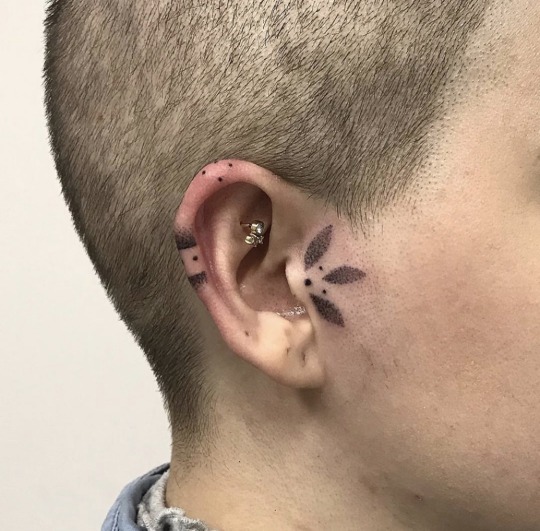
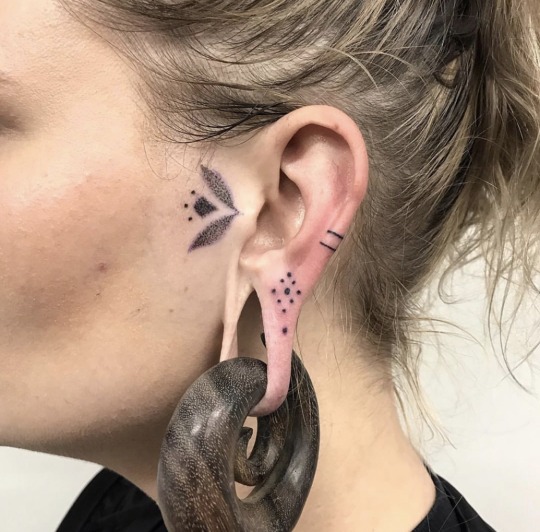
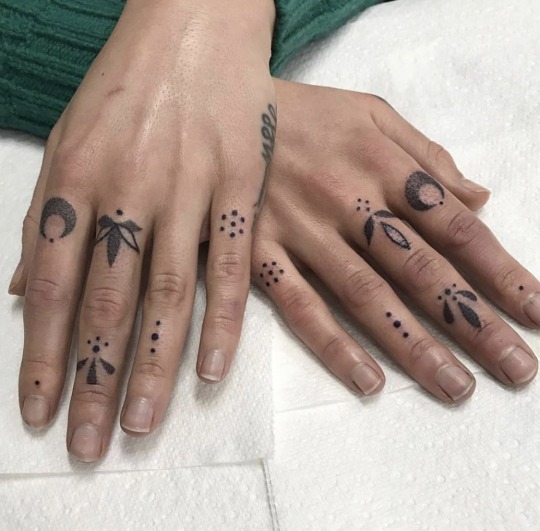
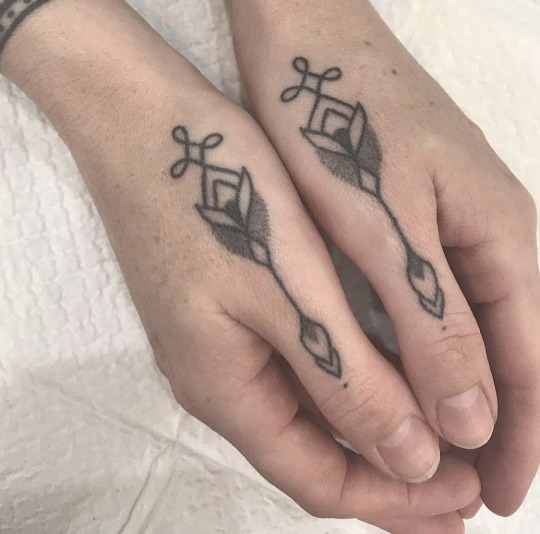

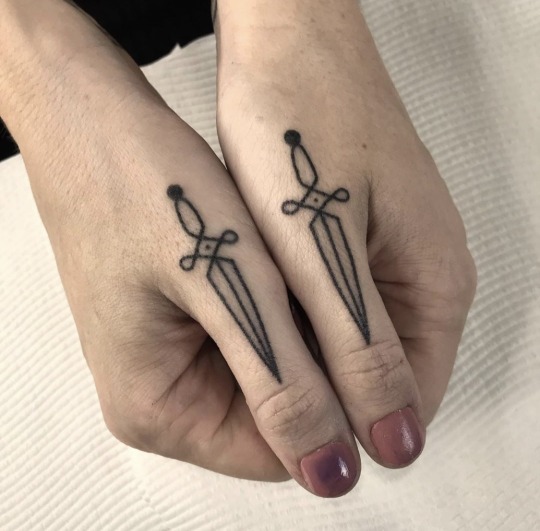
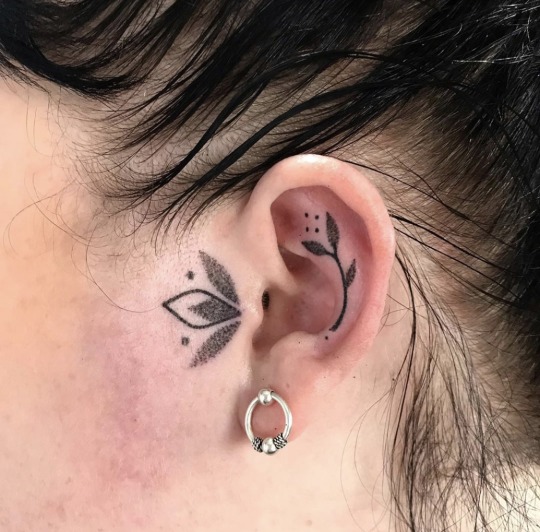
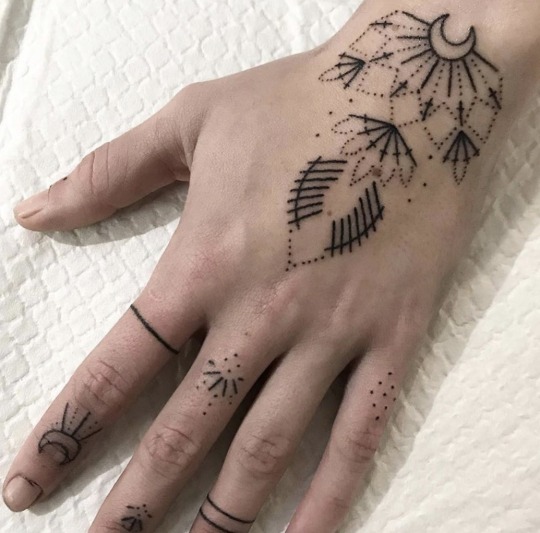
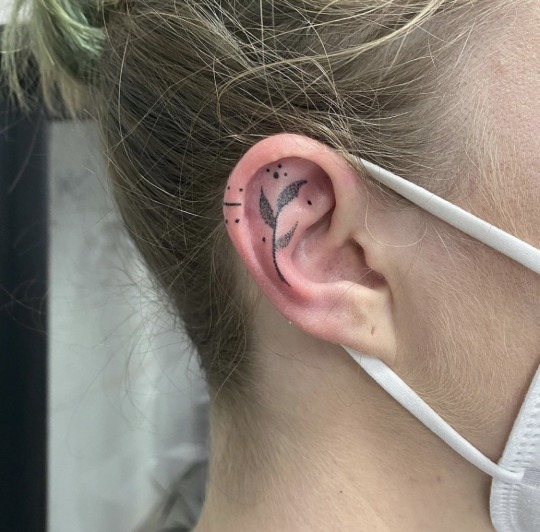
Hand and Ear Decorations
Handpoked Tattoos by the wonderful Amy Jones who I got to catch up with for the last episode of season one of the Not Jut A Girl podcast. Amy is known for her stunning hand and ear decorations which heal beautifully and are so brilliantly done.
0 notes
Photo
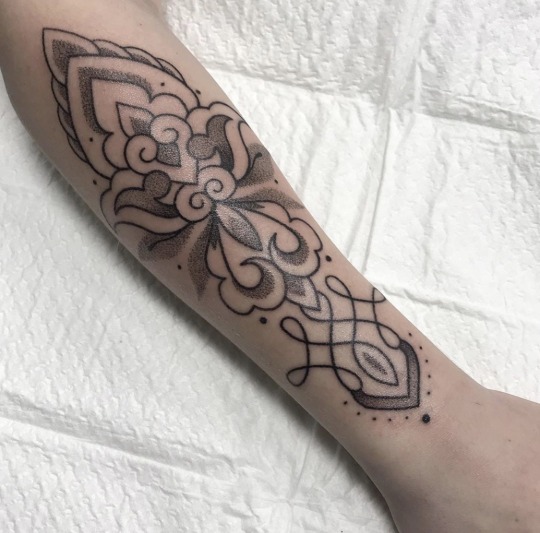
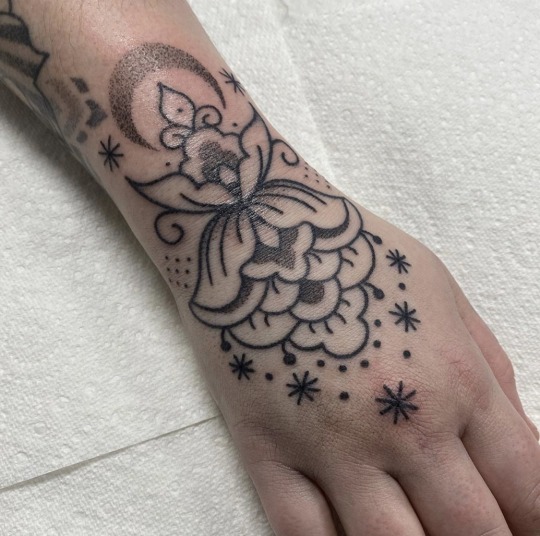
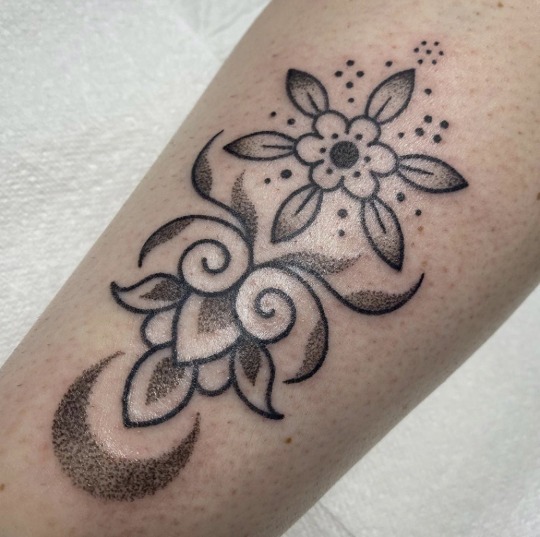
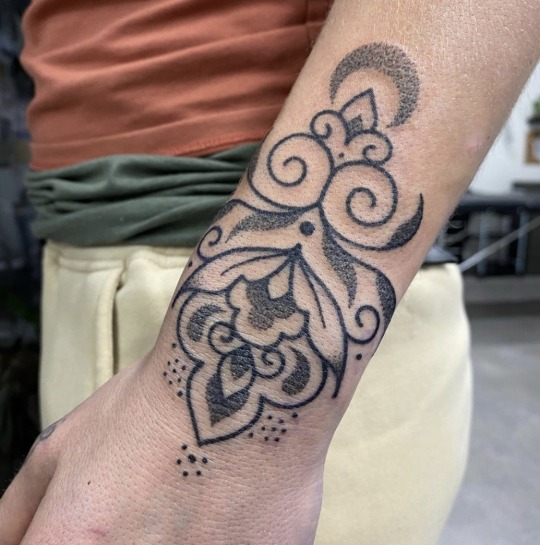
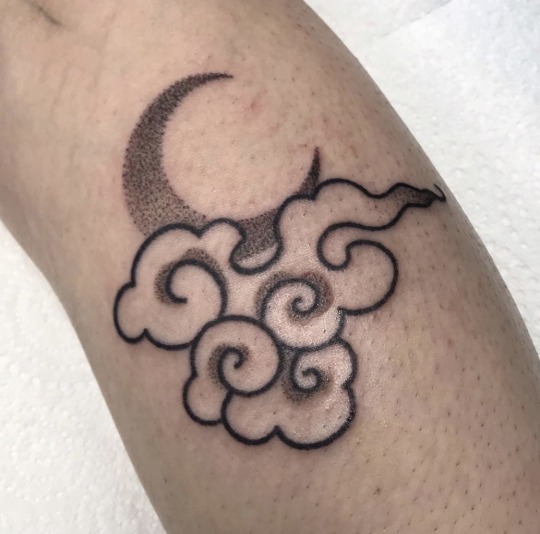
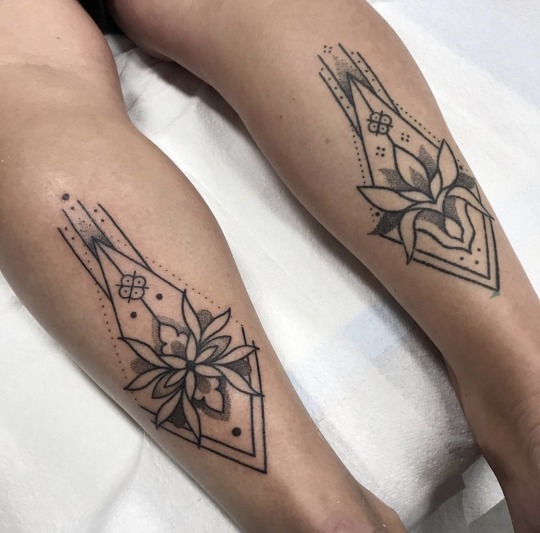
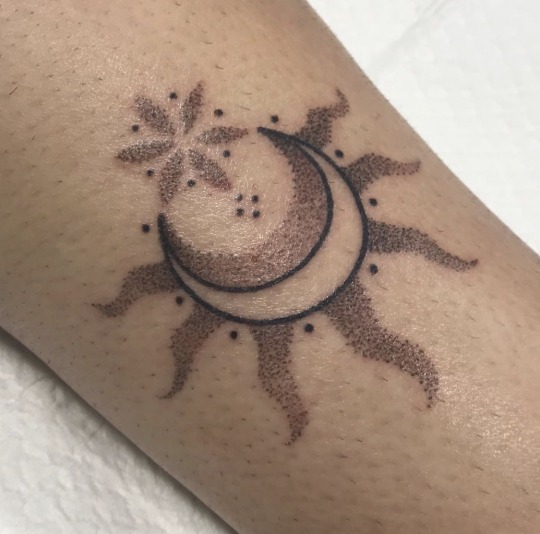



Amy’s Tattoos
Handpoked Tattoos by the brilliant Amy Jones who I got to catch up with for the last episode of season one of the Not Jut A Girl podcast.
0 notes
Photo
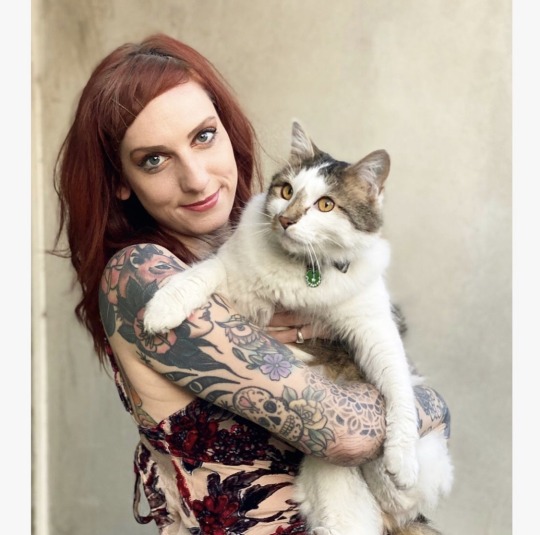
Amy Unalome
Introducing my twelfth, and final guest for season one on NOT JUST A GIRL: Tattoo Podcast, the wonderful Amy Jones who works at La Flor Sagrada in Melbourne, VIC, Australia and you can listen to her episode here.
0 notes
Link
0 notes
Photo

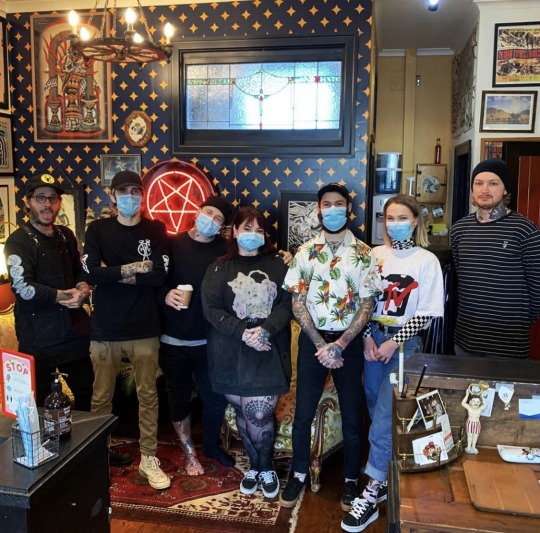
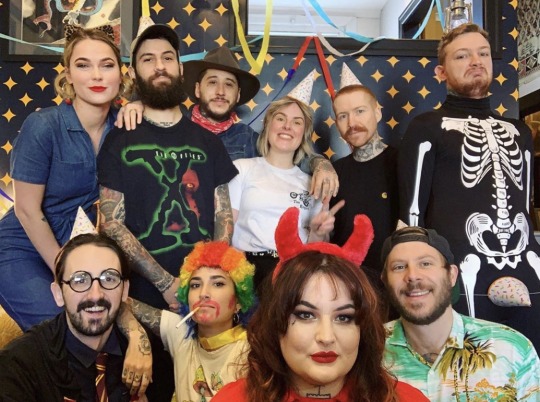
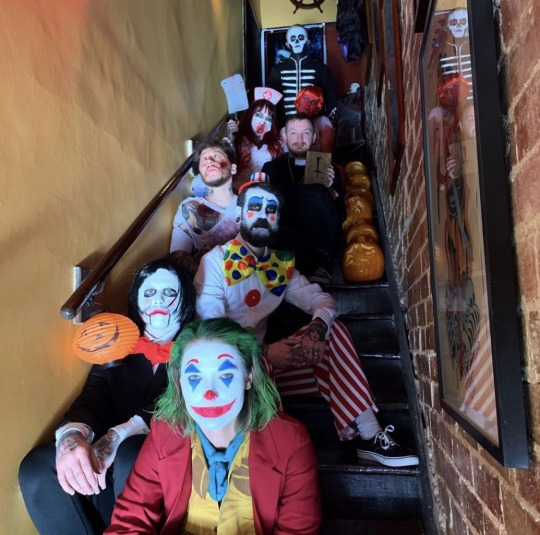

The Grand Illusion
On the eleventh episode of NJAG, Courtney talks about the amazing studio she works at, The Grand Illusion in Melbourne, VIC Australia. They are such a talented group of kind and beautiful people and you should definitely give them a follow here.
0 notes
Photo
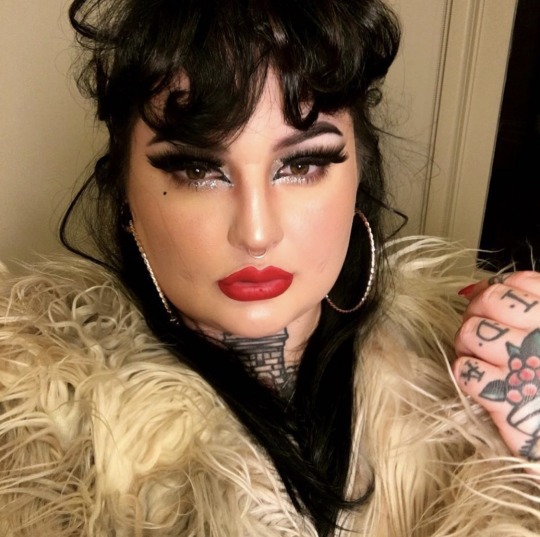
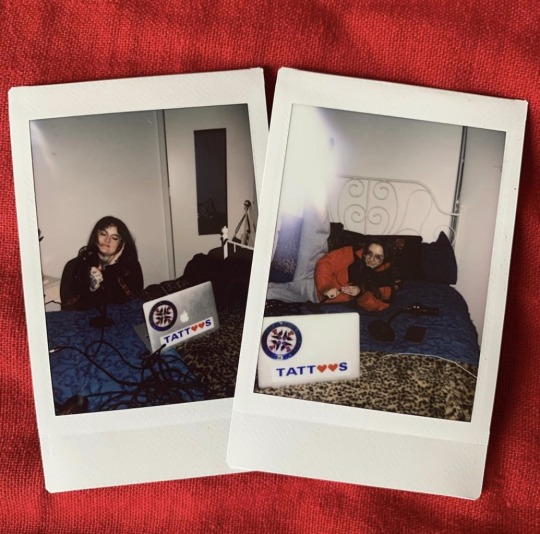
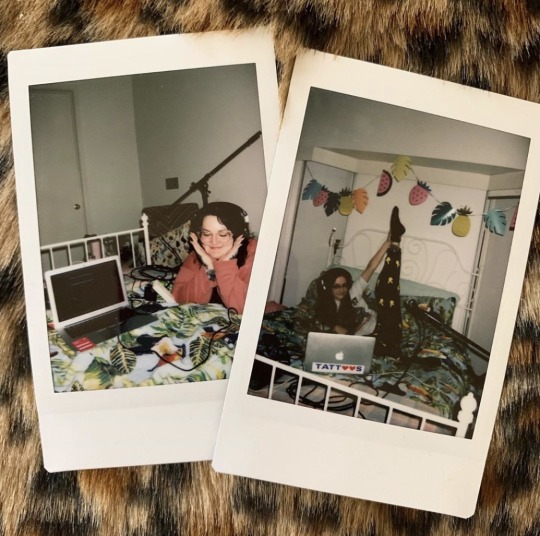
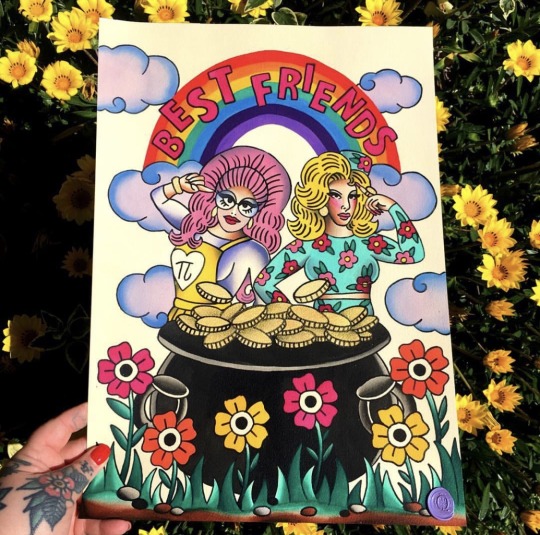
Down To Clown Podcast
In the eleventh episode of NJAG I got to chat to Courtney about her podcast Down to Clown. If you love Drag then you’ll love the podcast, so be sure to give them a follow and a listen.
0 notes
Photo
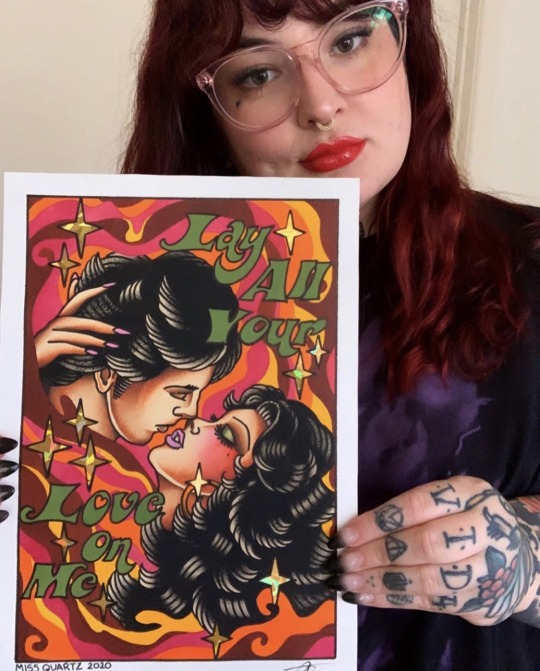

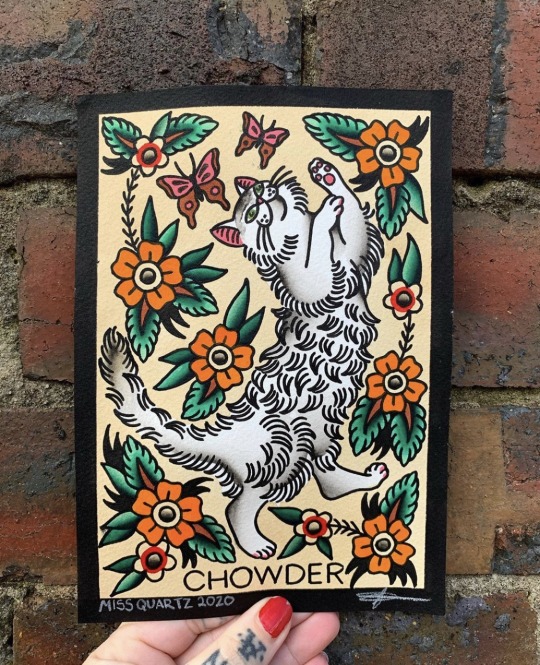
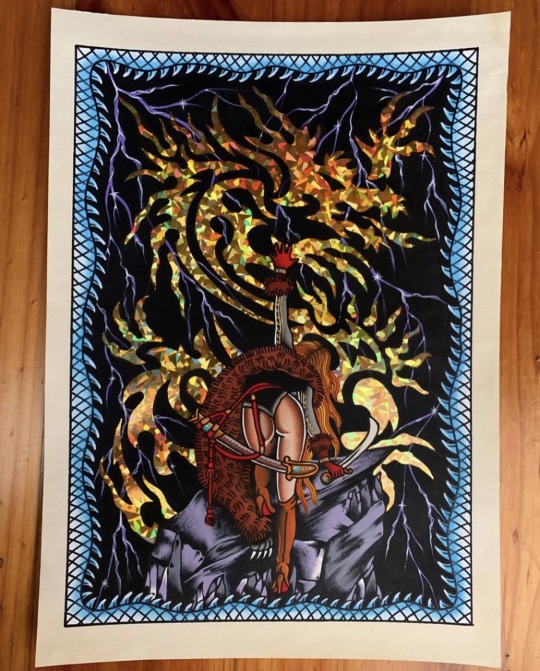
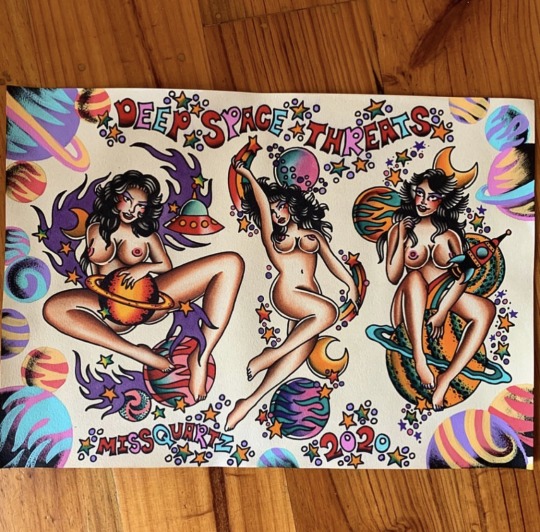
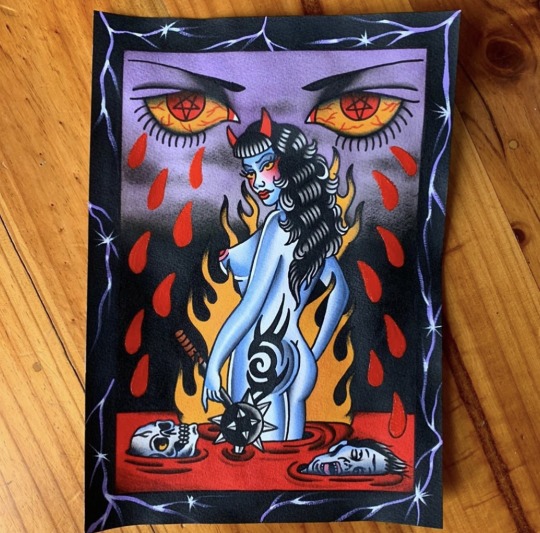
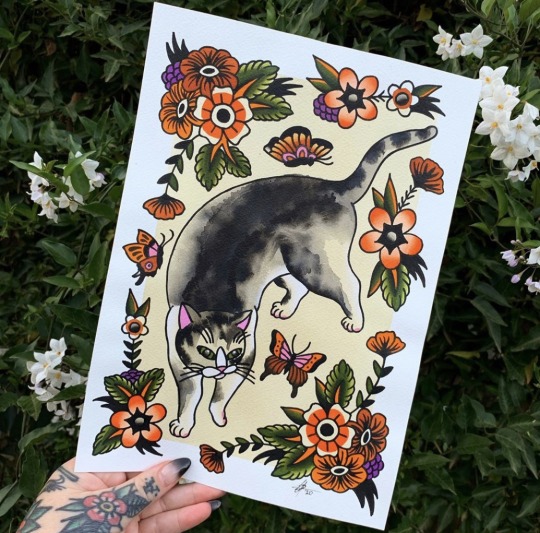
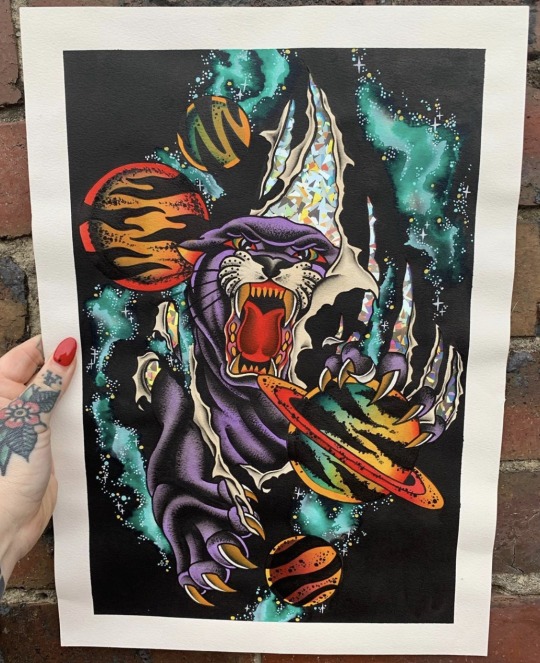
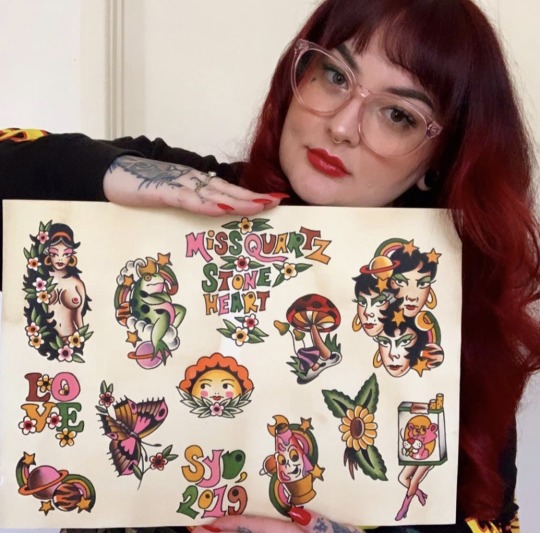

Courtney’s Art
Artworks by the talented Courtney who I interviewed for the eleventh episode of the NJAG podcast.
0 notes
Text
Not Just A Girl: Down to Clown
You can listen to the eleventh episode with Courtney here. Or you can find this interview on YouTube with English subtitles/closed captions here.
NOT JUST A GIRL: Tattoo Podcast
EPISODE TRANSCRIPT
Season 1, Episode 11: Down to Clown
Eddy: Hello, friends and welcome to Not Just A Girl, the feminist tattoo podcast, where I get to talk to some of my favorite tattooers about their lives and art practice. I'm Eddy and thank you for joining me for episode 11. Today, we'll be chatting about friendly tattoo studios, the tattoo community, and self-expression and drag.Before we begin, I would like to acknowledge the Aboriginal and Torres Strait Islander people who are the traditional custodians of this land that was stolen and never ceded. I am honored and grateful to be on the ancestral land of the Awabakal people. And I pay my respects to their Elders past and present and extend my recognition to their descendants.I'm very excited today to chat to the stunning and talented Courtney. She's also known as Miss Quartz and works at The Grand Illusion in Melbourne. Courtney is known for her vibrant, fun, and beautifully executed traditional tattoos. She's also one half of the Down To Clown podcast, celebrating drag. Thank you so much for being a part of my little podcast. It's so good to chat to you today. Courtney: My pleasure. Thanks for asking me. Eddy: So, how's your year been so far? Courtney: Well, I think, uh, as I can, as I think many people will say it's been ups and downs, the year started off extremely busy. And then, um, two months of ah being dormant, I guess. Someone asked me the other day they're like, are you still going to count this into your like tattoo career time? I was like, yes, I'm 10 years in October. I'm not like, sacrificing that landmark for myself. Eddy: That's so exciting. It's my 10 year this year too. But I don't remember exactly when I started. I just know it was some time I'm at the start of the year. So I go off, I just be like, okay, January. Courtney: Yeah. I'm exactly the same. I remember it being like around October ish and Tim Regard who I work with he, he, his date is in October, so I've just taken his, I'm like, okay, I'm jumping on that, you always remember when it is so. Eddy: Little anniversary twinsies. Courtney: Yeah, yeah, yeah. I've just adopted his day. Uh, I think he's okay with that. Eddy: That's so exciting that you're coming up to 10 years. Congratulations. Courtney: I know, thank you and you too. It doesn't, it doesn't feel like that long at all. I don't know how you feel about it, but I feel like it's like been a second. Eddy: Yeah. Courtney: In my life Eddy: I still feel like tattoo baby, sometimes. Courtney: Oh, yeah. A hundred percent. The older I get and the longer I do this, the more I realize I know absolutely nothing. Eddy: Yep. Yeah. I was definitely much more confident in my first year or two, then I am now. Courtney: Oh, yeah. I think it just comes down to age as well. Like, I'm not sure how old you were when you started, but just in that like late teens, early twenties stage, you just think you're the shit, especially when you're in your tattoo apprenticeship, you're like, yeah, I'm a tattooer, I'm so cool, I know everything, I've been doing this for six months.Eddy: I was in my mid twenties so I have absolutely no excuse for being that way. Other than ego. Courtney: I think, I think it's, um, it's something that comes naturally, uh, when you start succeeding in a creative field, I think it comes, you know, a lot of it does come from you. So you're like, Oh my God, I am actually so, so good. And then a few years go pass and you're like, I dunno what I was thinking.Eddy: It's so frustrating. Just kinda, just feel as good as I did in that first six months. Courtney: I know, but I think it's a good way to be. That's how you keep pushing and that's how you keep developing as an artist. And, um, I think the best way to improve is to run that race with yourself. Eddy: Absolutely. Absolutely. What, what was your first tattoo?Courtney: Um, my very first tattoo I ever did. I got to work and my boss was like okay you're tattooing today. Up until this point I'd just been like sitting in the studio cleaning, sketching, like um fucking around and like, you know, I don't know if you had them, but, um, this was before a pound of flesh happened and, uh, you could get actual body parts to tattoo, um, I was tattooing on these like weird, like Silicon rubber mats that were nothing like skin at all. Anyway.I got, I got into the studio and my boss was like yep you're tattin today. I was like, Oh my God, what am I tattooing myself? And he's like, no, you're tattooing me. He had these old, um, stars on his leg and he's like, okay, you're going to redo these. And I want another second star on the inside. So it was ah extremely stressful. I think there was three, the whole thing was probably like about that big. And I feel like it probably took me about two hours. Eddy: Oh my god. And like stars with like crisp points. That's, that's hard. Courtney: Yeah. Five point stars, crisp points and had to freehand the second smallest star inside the like, You know, existing one, it was a lot.Eddy: Oh my God, I can't remember exactly what my first one is, but it was either a rat and a skull, on my husband's foot or a penguin or my sister's ankle, but either way for both of them, I remember crying while I was doing it.Courtney: It's so high pressure. It's so so high pressure. I still have flashbacks now to when I first started and I don't know, just. That there was always like a few tattoos that would just let be kind of getting away from you. And I just remember moving halfway through tattoos and being like, I just want this to be over, I don't know how long I can keep doing this for. I don't know how long I can keep um, supporting my client emotionally through this, because I'm done with it. Uh, we always got there at the end but. Yeah. I always have those moments now where I'm like starting something big and I'm like, Oh, wow, like, you know, I'm feeling like really confident and I remember the days where I did not have that at all. Eddy: And you start to feel the sweat dripping down, like your stomach and your upper lip.Courtney: Oh yeah. Yeah. I need just like, I can't, I can't talk or do anything, but like I need a laser focus and this is all I can do right now. Eddy: Still have those moments. Courtney: I'm a lot like that now. Yeah. Eddy: Yeah. Well, I mean, it's funny cause like your work it's so powerful and vibrant and it exudes confidence and fun. So you kind of like when I look at your work, I can't imagine you even having a moment of stress, like just with the way your work appears.Courtney: Oh, thank you. That's so nice. Um, I'd say all the stress happens now beforehand. I think, uh, at the stage I'm at now, well, hopefully after these two months this still rings true, but at the stage I'm at now, It's almost like muscle memory. Like I know, I know exactly how all of my machines run. I know my set up, my environments super comfortable and I'm confident in my own skills. Now it's more like is the design a hundred percent exactly what I want it to be, what my client wants it to be. Am I bringing something fresh to the table? Um, while still upholding, you know, the traditional values that I value. So yeah, I'd say all the stress happens before now. Rather than during the actual process.Eddy: Yeah. That makes sense.Courtney: For me anyway.Eddy: I mean, that's probably the most important time to be stressing about it because it's like, if the design's not right, where do you go from there? Courtney: Yeah. Yeah, exactly. If the designs not right from the very beginning. The tattoos not going to be right at the end. Eddy: Yep. Yeah. Courtney: Yeah. Eddy: Have you always been interested in traditional tattoos? Is that, has that always been like your, I don't know, main inspiration in tattooing? Courtney: Not always. I started tattooing in ah street shops on the gold coast. So it was very much, um, the focus was very much on being an allrounder. You know, you should be able to be doing almost any style that walks through the door, which is a great base to start with. But, um, it led to a lot of years of, uh, Self-reflection and exploration and really trying to find like what I like to see in my own work and what feels good for me and what I'm naturally drawn to. So, um, I'd say it's probably, it's probably in the last, maybe five years that I've been really, really, um, attracted and dedicated to traditional tattooing.Eddy: Oh, that's awesome. Um. Courtney: Yeah. Eddy: Did, did you find that in your self reflection, it was about just looking at tattoos or was it just this whole thing of like pop culture and music and stuff as well? Because I know you're really into drag culture and all that kind of thing. Did that play a part in discovering your style?Courtney: Definitely I think, um, anyone who consider themselves an artist can recognize that they take inspiration from every aspect of their likes and, um, their lives and personality. Um, I think a big turning point for my work was recognizing what I liked and what my inspirations were, but also recognizing that it's just elements that I like rather than a like straight replication.Eddy: Yeah. Courtney: Yeah. And I definitely think um not completely stopping looking at other tattooers, but not putting so much gravity in what everyone else is doing around me has really helped me like push my own style and, um, just know who I am as an artist, I guess. Eddy: Yeah, absolutely. I, I find the same thing. Like I used to spend a lot of time looking at other artists and getting stressed out because I couldn't do what they were doing. And then instead I changed my attitude and approach and was just looking at the little tricks they were doing that was, that was attracting me to that work. And then just putting that aside, still keeping like little tricks and details in mind, and then kind of not even referencing another tattoo at all when I'm drawing or tattooing, it's just much more authentic as well.Courtney: Yeah. Yeah. I totally agree. And I feel like definitely with traditional tattooing, the references are important and the history is extremely important, but that for me, anyway, it was an extremely pivotal step where I could take those things. Um, but not be replicating it and being like, okay, these are all the things that I like from this style of tattooing, but I want to draw inspiration from all this other stuff in my life that I really, really love and that I'm drawn to. Um, and now, yeah, now I'm just like, okay, well, you know, that's the idea. So here we go, kind of seeing, yeah, just see what happens. See what comes out. Eddy: That's awesome. And it must be difficult I think in traditional tattooing specifically, to be able to find that happy medium between, you know, respecting traditions and following those like patterns, but then bringing something fresh to it because you know, you do, you do see a lot of replication and not that there's anything wrong with that for those artists, but it would be hard to find your own voice and stand out in that crowd when there's so many people doing it.Courtney: Yeah. And so many people doing it so extremely well as well. I think, especially, especially within Australia, the tattoo community here is so talented and vibrant and creative. And I really feel like there's a lot of people here pushing the envelope and like doing new, cool things. It's so hard not to be inspired and motivated by that. Um, but you know, on those down days, it is easy to look at all that and be like, I'm never going to get to that level. Like what do they have that I don't have? Um, so I think as my journey has progressed it's a lot of putting that aside and being like, well, you know, they're just doing what they're doing, doing what I'm doing. And you know, that's why people come to you. Not because you're doing something like, like somebody else, because you're doing your own thing. Eddy: Yeah, absolutely. And I think people come to you as well for the experience. I've, I've tattooed a few of your clients and they only had to say amazing things about you and how lovely were and how funny you were and how comfortable you made them feel and how much they enjoyed the experience of being tattooed by you.Courtney: Yeah. I, I think the experience is so important. I think you're probably the same as well. Like I get that vibe off you and, um, yeah, we've got a lot of crossover clients and I only ever hear good things about FLT, um, and the experiences that they have with you and your crew. Um, but yeah, I would say like, I have always felt that the experience is super important. Um, but it's also something that's come very naturally to me as well. As soon as I started tattooing it's like, I want to give my all and everything I have to tattooing and the people who are coming to me to get tattooed, um, because I feel like I get it so much from tattooing back. So yeah, I just want to like have fun. I want to like chat with people. Um, You know, have a good experience. Sometimes I'm even lucky enough to walk away from the experience with like a new friend in my life, which is so cool.Eddy: I love when that happens.Courtney: Especially when so many people yeah. And so many people struggle, you know, making friends and forming those connections as adults. And we're so lucky that it just happens for us kind of thing. Um, and yeah. I'm lucky enough to work at The Grand Illusion where everyone else holds those values as closely and as sacredly as I do. So it's um, yeah, the environment's super important. Eddy: Yeah. It's a beautiful studio and you definitely get that really fun, welcoming energy when you're there.Courtney: Yeah. Yeah. We we all work really hard on it. It's um, yeah, it just makes going to work, well, not even work, it's just, you know, I'm just going to go do what I love in a room with people that I love and yeah. Have fun, which is what's made isolation so hard.Eddy: Yeah.Courtney: So very very hard. Eddy: Yeah. I've, I've been the same, being away from the crew I work with has been really strange. Like, you know, when you spend so much time together in the studio and you all genuinely love each other and enjoy each other's company, it's, you lose a lot being away from that. Courtney: Yeah, for sure. It's um, it's just like another family and being separated from your family. It's really hard. Eddy: Yeah. Courtney: Mmm But I'm, I'm super keen to get back into it. It's it's going to be really interesting to see what the landscape is like after this, ah global pandemic. Eddy: Yes. Yeah. Are you guys allowed to, um, have the whole crew tattooing at once or are you going to have to stagger appointments and everything? Cause it's a small, smaller studio. Courtney: Yeah. Um, technically we could all be working at one time, but we want to make it as safe and, um, Yeah, just as safe as possible for all of us and all of our clients as well. So we're going to go back on, um, each of us doing less days and, uh, doing sort of like a rotating roster. So there's no more than like four, four artists in the studio at the one time. Eddy: We're doing exactly the same here as well. Courtney: Yeah, I think it's just the safest way. I mean, it's, it's what I feel comfortable with as well. Like I don't know how I would feel about going straight back into it with everyone in the shop. Um, I'm not necessarily super concerned for my own health, but just, you know, you want to keep it as like safe and, you know, uh, responsible as we can, I guess. And this is just another layer of it. Eddy: Yeah, it would be difficult to live with, you know, knowing that it might've been spread in your work space or by you. I don't think I, I would be okay with that. Courtney: Not at all, not at all. I'd feel so guilty, that would be awful. Eddy: Yeah. We take everything like about our practice so seriously that I like it's hard enough that we actually hurt it hurt people doing the tattoo, let alone hurting them in other ways. Courtney: Yeah, exactly. And I guess, I guess the tattoo industry is probably the most prepared for it as well. You know, we're all very, uh, careful with, you know, hygiene standards and all that kind of thing. So, um, I feel confident in our ability to go back and work safely. Eddy: Yeah. Yeah, absolutely. Courtney: Not just my studio. I feel like, you know, as a whole, most of the places that I've you know guested in and most of the people I know in, in the tattoo industry and lucky enough to call my friends are also taking it extremely seriously. So I think, um, that's a definite positive in this situation. Eddy: Yeah, a hundred percent, you know, we don't want to put anything at risk of like ever losing tattooing again, I think having it taken away from us for a couple of months it's if anything, it shows you just how important it is in your life and how much you love and need it.Courtney: Oh, definitely. I think in your first episode you said something like it's been so hard having, having that craft taken away from you and that, that that nailed exactly how I felt. Cause I was like, yeah, it's like the actual physical ritual of tattooing. That's what I'm I miss so much along with the social interactions of course, but like just not being able to do that thing that you love the most in your life. That's been really hard. Eddy: Yeah. I feel like we differ as well from some other industries in that we actually really love this, this is what we dream about. This is what we think about when we go home. Like, you know, this isn't just a job we do to get a paycheck. It's it's like in our fucking, every fiber of our being. Courtney: A hundred percent, the way I feel about tattooing is similar to, um, well, I, I hold it similar to how sailors feel about the ocean. You know, how there's a lot of songs and old hymns about the ocean is there one true love. She might be a cruel mistress sometimes. But she's this all encapsulating, you know, soulmate. And that's how I feel about tattooing. So being separated has been, has been hard, but it has been a nice break as well. Eddy: Yeah, especially every, I think everyone I've spoken to who is at that 10 year mark, like we are, it's like 10 years of working every single day and night and like never stopping. And every holiday has been including tattooing because, you know, tattooers, don't just take holidays for themselves. They do guest spots and conventions. And so, yeah, this is for many of us, this will be the first time we've ever actually like taken a moment.Courtney: Yeah. Yeah. It's, it's pretty, pretty heavy to think about. Uh, I personally I've struggled a lot. Because, um, I thrive off routine, but I'm awful at putting myself into a routine. So going and going to the studio and having, having the rest of my life centered around. Being at the studio and tattooing, and then having all of that taken away and me left up to my own devices. It's been quite difficult. Eddy: Yeah. Even, even someone who's as hard working and motivated as you. Yeah. If you don't have that routine that you've worked so hard to create. It's just like, who am I? What do I do now? Like, stand under the shower crying for a couple of hours a day. I don't know. Courtney: Yeah exactly, just lie face down on my floor, I guess for a four hour nap. What else am I going to do? Eddy: Thank goodness for cats though really. Courtney: Oh yeah. Yeah. That's that has been great. My cats have absolutely loved me being in isolation. It's been the best time of their life. Yeah. Anytime they ask for biscuits they're getting it, you know, they've got my body heat keeping them warm all day. They're loving it, which you know, that's another positive from it as well. I guess. Eddy: Absolutely. One of, one of my cats, cause I have four and he's like, I know it's naughty to say, but he's my favorite. He's just been like getting extra treats and extra food that he's got his, this like beautiful little isolation boddy happening at the moment. And it's like perfect for winter because he's just so warm and round and cuddly and it's Oh. Courtney: You've got a those curly haired cats, right?Eddy: Yeah. A little Devon Rexes. Courtney: Yeah. So is their fur, they've got quite thin fur right? Eddy: Yeah, it's super thin. Courtney: Do you need to put them in like little jackets for winter or anything? Eddy: My mine don't like jackets, but they literally just like follow us around and are attached to us. You know, they're in front of any heater. They live under blankets. Like my youngest one spends probably half the day underneath the doona on our bed.Courtney: Oh, I love it when they do that, I love that so much. Often my cat, like she'll, she'll get up when I get up. But someday she'll be like, you know what, I'm going back to bed and like crawl back under the covers. Eddy: It's the best when they sleep in with you as well. And you both lay there, like I know I've got to get up. I have breakfast, but this is warm.Courtney: Oh, yeah. Yeah. That honestly that's been me every day for the last, like two months, I'm like I should get off and start my day but I'm going to lay in bed for another two hours scrolling on Instagram and watching YouTube with my cat. Eddy: Well, even this morning when we messaged each other about today, we'll both like I have a cat on me.Courtney: Yeah, yeah exactly. I'm not quite willing to move just yet, she's being very cute. But that's been really great. And that's been, it's been, um, this whole experience has really put a lot of things into perspective and made me realize how lucky I am to live in a house that I'm comfortable in. Live in the city that I love, you know, I'm fortunate enough to be able to have a pet too, that I can, that I can care for, um, financially and emotionally. Um, so yeah, I really feel for everyone out there who's, you know, in isolation, living on their own, maybe hasn't had a lot of contact. I just, I can't imagine how hard it's been. Eddy: Yeah. It really makes you reflect on your privileges in life. And, you know, I think we get really complacent every day and complain about things that in the grand scheme of things don't actually matter. And, you know, watching this whole pandemic unfold across the world and you know, our friends in the US and, you know, not getting any support at all, and some of them losing their shops and homes, and, you know, while we're sitting quite comfortably here, like if you don't reflect on that privilege, there's probably something very amiss.Courtney: Yeah. Yeah, yeah, definitely. Yeah. I just never thought we'd live through something like this. I a hundred percent thought we'd turn the corner of this month and it'd be like zombies, for sure. Yeah. Yeah. But that could also be me poisoning my own mind and just watching far too many horror movies. Eddy: I can't even do horror movies. I have nightmares and I'm a little bit soft around the edges. I do sci-fi but not horror. Courtney: Yeah. I can understand that. You know, I, there was a long period in my life, in high school where the early stage of high school where I was like, Oh no, not horror movies. It's like, I'm not into it. And then I dunno, just like this switch flipped in my brain. And it's honestly like the first thing that I always go for, which can, you know, lead to some interesting personality traits but what are you going to do? It's the same as, I don't know. I don't know. We're talking about are what podcasts we listen to? I listened to a lot of true crime and there are there points in my life where I've had to be like okay we need to have a detox from this because I live in the safest suburb and I'll be like, locking my windows and doors being like, I'm going to be invaded. My house is going to be invaded. Like someone's going to murder me for sure. So, yeah, there's a lot of, um, that kind of stuff that I love that I have to limit myself to.Eddy: Amazing. I've actually, I've been watching Killing Eve lately, which is like so amazing and just all of the ways that she murders people, it's just like, yeah, that's a, that's a good way to deal with some really toxic men in the world. Courtney: Killing Eve is so fantastic. It's such a good show. Eddy: Yeah. It's so like, Wonderful to see a show with queer representation where women are not objectified, like Villanelle is stunning and stylish and crazy, but as beautiful as she is, I don't feel like her costuming or the camera angles or anything about the story ever objectifies her.Courtney: Hmm. I think it's because, uh, they've built her into a complex character. She's not dressed like this Hottie that goes around killing people in hot clothes. She's got, uh, complexities to her, she's a round flawed, but rounded character. So, um, yeah, I love that show so much. Eddy: Yeah. It's also really good to see women being represented in TV in a way where they are like, well, rounded and multidimensional. You often see the characters in shows, like for example, Stranger Things, which I love, but you know, the lead character is powerful, but she doesn't speak much or, you know, got other characters, you know, there who do speak a lot and they're teased for that. And then there may be like, You know, not used in other ways like women and like, you know, non binary and trans people aren't given like characters where, you know, they're fully, well-rounded like male characters are, and it's even interesting how men respond to shows like that. Um, someone the other day was telling me that some guys were like, Oh, how come all the male characters in Killing Eve are like really dumb, and the only smart ones get killed. Like, Oh, we wouldn't know anything about that happening like to people who aren't men. Yeah.Courtney: Yeah. It's been, it's been really nice the last, I don't know, the last few years seeing more storylines centered around female, non binary and queer characters in an empowering way. Um, I don't know if you've ever, have you ever watched The L Word? Eddy: I did many, many years ago when the original show came out, but I haven't rewatched it or there's a new series isn't there? Courtney: There's a new season out. And, um, The L Word was great when it first came out. If you rewatch it now it's extremely problematic. Um, a lot of, a lot of transphobia and, and that kind of thing. Um, but the new season is fantastic. I mean, there's still some flaws there. We don't see a lot of different, um, body types.Eddy: Yeah. Courtney: But, uh, it's nice to see people of color, uh, non binary, uh, non-gender conforming people. Um, and it's so nice seeing queer love stories coming to fruition, um, without it being completely tragic. Eddy: Yep. Courtney: I mean, there's still some of that in the L Word, because it is a soap opera so you need that drama, but it is nice and Hollywood as well. I'm not sure if you've watched Hollywood on Netflix. Eddy: It's Amazing. It is amazing. Courtney: It's so good. Yeah, definitely not what, not what I was expecting. Just because you know, it's from Ryan Murphy. So every episode I was like, Ooh, I was like waiting for someone to get murdered or for some like ghost to pop up in the background or something like that. But it was just like a really lovely story.Eddy: Yeah. It was just so beautiful. This idea of being able to rewrite history where, you know, Rock Hudson was able to come out and be a gay man and not, you know, live his entire life and then come out just before he died of AIDS, you know, like, which is what happened in reality. It's just, yeah, it's really lovely how things are rewritten. And She-Ra is amazing as well because it's completely diverse. It's so, it's probably the most inclusive show I've ever seen and it's happy and it's happy endings and it's beautiful. And it just makes you feel so full of joy. Courtney: Yeah. I think those storylines, especially at such a troubling time as now are even more important, you know, cause it is, it is hard to sit down at the moment and like watch something that's super heavy and serious, you know, we need a little bit of light in our lives.Eddy: We do. Absolutely. Yeah. And it's, it's really interesting because I feel like. This change is happening across arts, everywhere. Like, you know, we're seeing much more representation, um, in TV and film, but it's happening in tattooing as well, where, you know, we're celebrating different kinds of bodies, more, we're like, Inviting different kinds of artists and styles, and we're giving people a space to be themselves without all of that toxic judgment that has weighed the industry down for so long.Courtney: Yeah. Yeah. And I think I was thinking about this earlier today and I really think the changes in the tattoo industry. Um, we can really thank from, we can really thank grassroots efforts. That's what I believe in. Like, I'm not, um, I'm not a very organized person. Like I can't what you did with Not Just A Girl Flash Day and like building that up and with this podcast. And you've got a very clear vision and, um, you're very articulate in the way that you voice your opinions and standpoints. Eddy: Oh thank you.Courtney: Um, I often feel like I'm a rambling mess. I find, uh, I, I, I affect change the best way I affect change is by, um, just trying to be positive, creating like a very equal environment around me that hopefully people don't ever feel self conscious about anything around me. And I feel like my attitude is reflective in a lot of other people. And that's why we have seen such a nice change in our tattoo industry, because there's just a lot of nice people doing the right thing. Eddy: There is. Yeah, absolutely. Courtney: And it's good to see. Eddy: Yeah. And that's the only way we move forward. Like, uh, it's something that I spoke about with Onnie the other day, how it takes all different kinds of people. Like approaching it in all different ways to affect change. Like, you know, you do need that person holding the fucking Molotov cocktail, like screaming down the street. You need that person who's gently nudging and putting like soft reminders. Like you need the whole spectrum in order to affect change because different people are going to hear um, things in different ways and resist change according to their own perception or experience. Courtney: Yeah. Yeah, definitely, I, a hundred percent agree. It takes, it takes everyone. W as long as we're all working and you're doing your best, they get the best you can. And you're putting as much energy as you can into doing the right thing, then we're going to have positive outcomes.Eddy: Absolutely. Courtney: And I think, I think it's a good thing to remember because a lot of people, um, especially like, uh, With what we saw with, uh, the fires this summer, you know, a lot of people were just feeling like really helpless and like, Oh, I can't do anything about it. And it's like, you don't have to, even if, even if it's just like reposting something on your Instagram, that's helping, you know, you don't have to, you don't have to be driving out to the country and fighting the fires yourself.Eddy: Exactly. Courtney: As long as you're, as long as you pushing towards the right thing, that's all that matters. Eddy: Yeah, well, you and Avalon and the whole crew at The Grand Illusion have always contributed a lot to the community. You guys do charity work and you do flash days, and it's always really beautiful seeing how much you guys contribute to a better world.Courtney: Oh, thank you. Yeah, we we all try really hard. I think. I mean, I don't want to speak for everyone in the shop, but I feel like the general consensus with us is that, um, We love what we do. We love our community. Um, and we love tattooing so much that it just feels right to be able to give back, you know, we might not be able to, we may not be able to spend the time, you know, putting the actual labor into you know, helping at a soup kitchen or whatever, but, you know, we can, we can affect change through art, which is such a great feeling. Eddy: Absolutely. Yeah. Yeah. And I think, you know, you definitely do that through your art. Like, you know, your pinups and everything are always so powerful and beautiful. And I think you also do it through your podcast too. Like the fact that you have a podcast that's celebrating Drag, like the more we can talk about like queer culture and everything, you know, the more that helps affect change as well. Like, you know, would you like to tell our listeners about Down To Clown? Courtney: Of sure. Yeah. Um, I have a podcast with, uh, my best friend, Georgia it's called Down To Clown. Um, Basically, we just talk about each episode of RuPaul's drag race as it comes out and yeah, just, we just talk shit basically, but we really, we really love to take the time to highlight, um, what we're seeing in the TV show. Um, and we also like to talk about as much local drag events and queer events, um, and creators as we possibly can because it's, um, It's just super important to the both of us really. And it's just nice to be able to put some, you know, light kind of light entertainment out there. You know.Eddy: Yeah, absolutely. Yeah. Um, and there's like such a great scene in Melbourne for drag at the moment as well. Like there always seems to be shows happening and like performances. Courtney: Yeah. Yeah. We're um, we're very spoiled for choice here. It's fantastic. I cannot wait until all the bars open again. Eddy: Yes. We've only recently had, um, kind of regular drag shows happening in Newcastle before the shutdown, but hopefully they can continue again after lockdown. Courtney: Yeah. And I mean like all it takes and this goes for wherever you are. Um, wherever you're listening to this from all it takes is to go to your local drag show, you know, don't and, and, you know, keep an open mind. Don't expect to see drag that you're seeing on, um, on Drag Race. Go with an open mind, be open to new experiences because there's a lot of people, um, putting really fantastic stuff out there that you may have never seen before. So I think it's important to keep an open mind about that as well. Uh, in February, I was actually up in Sydney, a guest spotting at Stone Heart.Eddy: Oh was that for the Madi Gras?Courtney: Yeah, for the Madi Gras Flash Day and we all went out and we ended up at this queer event and there was a performer, a drag performer dressed as a sloth. Eddy: Oh my God. Courtney: Right. Draped over this couch, performing to Kyle Minogue's Slow. And it was honestly the best thing I've ever seen. I was like, this is genius. It's so smart. So yeah, I guess, I guess my message with Down To Clown is, uh, Keep an open mind and support your local drag acts. Eddy: Yeah, I guess another thing about the local drag acts is a lot of the time, you know, there's people who aren't in privileged positions with a lot of money and costumes, like what we're seeing on TV, or they're just starting out and trying to find their confidence and trying to find their own style as a performer as well. And if we don't show up and support them, then like how do they grow and how do they ever reach those heights that they have the potential for. Courtney: Yeah, exactly. And I think, uh, with Drag, the most important thing about Drag is that it's just self-expression so it doesn't matter if you've got a lot of money behind it, like that shouldn't be the case. You shouldn't be going to a drag show and expecting to see, you know, gown's and outfits that are, you know, thousands upon thousands of dollars, you should just be going to support someone else's self-expression and, uh, see how it impacts your experience as well. Eddy: Yeah, absolutely. And, you know, I think in this weird, like, Instagram culture we've got going we've almost lost sight of what self-expression really means. Like, I think, you know, people limit themselves of like, I can't afford those beautiful things so I can't really express myself fully. And you know, there's so there's so many ways to do it. Like tattoos, hair, I don't know, like just the way you hold yourself, the way you speak, anything. There's so many ways to express yourself. Courtney: Yeah, definitely. I think, um, I mean, I love Instagram. It's a fantastic business tool for us and it's a great way to connect with people in your creative community, for sure. I don't think it, I think we have to keep in mind the damaging effects that social media can have. I call it a, it might be a bit mean, but I call it beige culture. And I think the Kardashians to blame for a lot of it. That, you know, for a while, there the lust to be exactly like Kylie Jenner or Kim Kardashian completely erased subcultures for a while there.Eddy: It did, it really did.Courtney: Like I was not seeing any new, like I was not seeing any baby goths or anything for awhile, then I was like, where are they? Eddy: Yeah, it's so crazy. Courtney: But I think luckily we're having a turnaround now where, um, you know, subcultures are getting stronger again and, you know, people are finding their voice and, um, Less afraid to be different.Eddy: Yeah. I'm particularly loving the Western thing that's happening at the moment, you know, with like Orville, um, and is it Orville? Yeah.Courtney: Yeah, Orville Peck, yeah.Eddy: [And you know, like Lil Nas and everyone's like reliving their love for Dolly, which is important. Um, but yeah.Courtney: Very important. It's really good to see and it's just like, You know, anyone younger out there is listening. Just follow your heart, dress the way you want to dress expresses, express yourself the way you want to express yourself. As long as you're not hurting anyone.Eddy: Exactly.Courtney: Who cares if you're different to everyone else and you don't need, you don't need money to get by. I think that's another big issue within the tattoo community. There's a lot of people who put way too much value on making money, being like a baller, um buying all this like Gucci stuff. Eddy: Rolexes. Courtney: Yeah. Yeah. And it, and I think that sends the wrong message. Eddy: Yeah. Courtney: A lot of the time where it's like that it's becoming more, what can tattooing do for you rather than what can you give back to tattooing.Eddy: A hundred percent. Courtney: It's easy for me to say that because I've never had a big drive for material stuff. Eddy: I really love buying clothes and stuff, but yeah, I still would never, uh, use tattooing as my means to fund that in, in the way that perhaps some do like, you know, I believe in artists getting paid, what they're worth, because this job is difficult and it is a luxury, but at the same time, Yeah it's, it's about the art first and foremost, and the customer and making sure that they're happy because they're the ones living with it. Like, you know, the fancy boots that you get to buy at the end of the week. Like they've got nothing on how that person feels about their body. Courtney: Yeah, yeah, exactly, exactly. And I think, um, This law, this time of isolation, for a lot of tattooers, a loss of income. It's hopefully been a good time to reflect and reevaluate what's, what's important. There's nothing wrong, you know, like if you are a money motivated, then like, cool, that's your thing. But as long as it's, because it's what you want to do. And because that's your personal goal, not because oh everyone else on Instagram who tattoos has like Gucci slides so I need Gucci slides. You know what I mean? Eddy: Yeah, absolutely. Courtney: As long as you follow your own path and, um, what you desire, I think that's important. Eddy: A hundred percent. Courtney: But I'm quite anti-capitalists so.Eddy: I know I'm I'm, you know, theoretically I'm very anti-capitalist but I still get suckered into buying shit all the time. Courtney: Oh yeah. Well, I mean, it's impossible. It's shoved down our throats 24 seven, you know, like how can you avoid it? I'm definitely no Saint I definitely, um, Buy a lot of shit that I shouldn't be buying. Eddy: Yeah. Yeah. But I mean, that's another thing with like, isolation that I've been able to reflect on the fact that actually when I'm feeling a bit shit, that's when I go and start buying stuff. So maybe I need to recognize those feelings, sit in them for a bit and look at other ways of having an outlet. Like, you know, maybe I can try and channel it to something more creative and more helpful or something more community based. Courtney: Yeah. Yeah. I think that that's like a really positive way of looking at it, but also I don't feel guilty for buying stuff occasionally.Eddy: Yeah. I mean, we have enough guilt. We live in this friggin colonialist Catholic patriarchal society that loves making us hate ourselves and feel guilty about every decision we make. Courtney: Yeah. Yeah. And I guess, um, from my standpoint, I guess I lean in a little bit to hedonism, so it's, uh, I don't like anyone feeling guilty for something that makes them feel good as long as there's no one's getting hurt.Eddy: Yeah, absolutely. Yep. I agree. And that's what the interesting thing about like what we're talking about with the whole like Kardashian culture, like on one level, I'm kind of like oh, yeah, like they're seeing the flaw in the system and they're using it against itself to set themselves up in life. But then at the same time, they're like they're removing this whole idea of doing things because you love it or doing things because it makes you feel good. And just focusing on fitting in to very, very, very small, specific idea of what you have to be. And there's, there's no joy in it. There's no personality in it. Courtney: Yeah, I've got to say when, when the Kardashians started rising to fame, I did have like that respect for them where I was like, well, you have really done, really build a whole empire out of nothing, really, and props to them and you know, like, being all woman as well. It's like, yeah. Cool. But yeah, they've come and have success they've garnered and the amount of wealth and power they have, and they're still on Instagram, promoting skinny tees and, and you know, shit like that. So, um, I just can't. I just kind of have any respect for that. Eddy: Nah fucking patriarchal pawns. It's horrible, but this is why I love Dolly Parton because you know, when she was a kid, she saw a lady and that she wanted to look like, and she spent her whole life shaping herself to be this image of what she thinks is beautiful and doing it so unashamedly and doing everything that she wants to do to bring herself joy, but then also genuinely giving back to people without expecting anything in return.Courtney: Yeah. Yeah, absolutely. And just, um, you know, I might not agree with her religious views, but she's always just been putting positivity out there. She's always been about positivity, love and acceptance, regardless of her religious views. So I think a lot of people should be taking a lesson from Dolly Parton. Eddy: A hundred percent, except f or yeah obviously.Courtney: Plus her music just makes you feel good.Eddy: Oh my God. Nine to five. It's the Anthem of my life. Courtney: Yeah. I remember when I was working at the last studio I worked at, at Voodoo. I was driving into work blasting nine to five, like, yes, this is my anthem. I'm like, fuck the man. Fuck 9 to 5. Meanwhile, driving to work at about 11:00 AM, knowing I was ony going to be at the studio for a few hours.Eddy: But it's the most like socialist song like to ever come out of the eighties. It's fucking brilliant. Courtney: Yeah yeah.Eddy: We can all relate. Even if we don't work nine to five. And even if we do work for ourselves, you know, we're still paying the man with our taxes. Right. Same thing.Courtney: Exactly. And I think um ah Anka on your episode said, um, she's the worst boss she's ever had. And I related to that so hard, I was like, yeah same, no one’s been as awful and as much of a hard task master as I have been too myself. Eddy: Yeah. Oh same. Sometimes I have to like really kind of stop myself and watch how I'm behaving, because I don't want to be that kind of boss to the people I work with. I like micromanaging the fuck out of myself to a point where it's really exhausting and yeah, I don't want to do, don't want to do that to another person, they're already doing it to themselves.Courtney: I bet that must just be such a hard balance for you. Uh, not only managing yourself, but managing a studio and trying to manage the people within that studio, but also not managing them too much. That seems like a very hard line to walk. Eddy: Yeah. I have very like clear goals and ideas of what I want FLT to be about and how I want it to be represented, and how I want things to play out in the studio. But then at the same time, like I really fucking love and respect the people I work with and I want them to feel free and individual. So it's like, you know, the part of me who's just like, wants to be the supportive friend and uplift all of them is like, yeah, just do whatever you want. And then the other part of me, who's like, I can see it, a drop of ink on the ground can you please clean it up right now? Courtney: You need, you need to get yourself a Sully, like what we have. Eddy: Well currently I have. Courtney: Where you can be like, sorry, you go.Eddy: No, I was going to say, Currently, I have a, an amazing apprentice who, who does help, help me keep everything in line, but one day she'll be tattooing and I won't have that anymore. Courtney: Yeah. Yeah. It's true. True. Yeah. Honestly, Josh's decision to take on Sully. Um, at The Grand Illusion was probably the best decision he's made since I've been there. Eddy: Awesome. Courtney: At first I was like, you know, if you want to hire someone, that's cool. Like, you know, I'm not bothered. I don't mind setting up for myself and all this kind of thing. And now that Sully's here, I'm like, I never want to set up for myself ever again. Eddy: Like do you go on a guest spot and be like, I don't, I don't even know what to do now. Courtney: Yeah. Yeah. And I'm like, Oh shit, I've gotta factor like 20 minutes either side for setting up and packing down, usually more because I'm like talking shit while I'm doing it. And not like, you know, not doing it as efficiently as I should. Um, so yeah, I'm very spoiled in that respect. Eddy: Same. It takes me so long to set up and then I like to put my needles in my tube and my machine together and everything in front of the client so that they can see that everything's done cleanly and professionally, and that like, I'll be sitting there chatting to them away about whatever bullshit we're talking about. And it'll take me 15 minutes just to get the fucking needle in the tube. Courtney: Yeah. Yeah. I like doing that too, but I like to do that because I, like, I like to get all that chattiness out first, you know while I'm setting up and you know, like, you know, we're chatting away and then once I get into the linework I'm like, okay, let's let let's chill. I'm not going to be so chatty now. Like it's just focus from here on out. Eddy: It's so hard sometimes to like, communicate that to the client as well. Like. I'm not ignoring you. I really do like what you're saying, but please just let me Courtney: I'm happy. I'm happy for, to take someone on whatever journey they want, you know, like I'm happy if someone's super chatty, I'm happy to be super chatty back. Um, if someone wants to sit there with ear, like, you know, earphones in and just like watching YouTube or listen to their own music, I'm chill with that too. Um, luckily, luckily The Grand Illusion, because it's one big open room and we're all constantly having conversations across the room. Um, one, when I'm doing my line work, It's it's easy for my client to slip into the conversations in the room and then I can, I can focus.Eddy: Yeah. Courtney: But I'm also not, I'm also not afraid to be like, Oh, okay um, during linework, I'm not going to be so chatty, but once we start shading, We're back on. Eddy: Yeah. Yeah. It's so good. When there's other people to distract them, like other clients saying stuff. Yeah. I that's what I love about having a studio that is a big open room because I don't know, it feels so much more joyful. And I think clients walk away like sometimes making new friends or just having, like, I don't know a more fulfilling experience maybe. Courtney: Yeah. I love it when clients make friends in the shop, it happens so often where they start up a little conversation and then they'll follow each other on Instagram when they're done, is so lovely. I'm like, yay.Eddy: It's so good. Yeah. Courtney: We could all use more friends. We could all use more friends and more connections. Eddy: Yeah, a hundred percent. And like you mentioned, um, earlier, that you know, as adults, we find it really difficult to make those connections now and you know, that's yeah, like you said, we're really lucky in tattooing where we actually get to make connections every single day and they can be really meaningful connections. And I think because there's something so intimate about what we do. And we can really get a much deeper sense of a person in that time we spend with them. Like the connections can be much more, um, real, for lack of a better word. Courtney: Yeah. Yeah. It's also, um, surely you would find it as well. It's it's also an interesting, um, The dynamic. Cause I guess your clients follow you on Instagram quite awhile. So they sort of get a sense of your personality and what you like. Um, and then often we're at the backfoot. It's like, Oh, you, you know, all this stuff about me but I didn't know anything about you. So, um, that can be a little challenging at times. Or sometimes someone will bring up in a conversation, something they saw on my story. I'm like, How do you know that? Eddy: Yeah, absolutely. And I have like a friggin memory like a sieve, you know, I've, I've gone up to customers and shook their hand and introduced myself and they're like, you tattooed me last month. And not because they weren't wonderful people and like nothing is that. I just literally forget things until I see the tattoo and then I'm fine. But yeah, it's, it's really weird because they, I think they, in knowing more about us, they kind of already perhaps feel more connected to us or, and we're, yeah. We're just like, Oh, I don't even know who you are, but you're very lovely. Courtney: Yeah. Yeah. Yeah, it is. It is quite nice, but, um, Yeah, it can, it can be challenging. And I do see a lot of people, a lot of other tattoo artists who are a little bit more introverted, kind of struggle with that a little bit. Um, it's not, it's not something I can relate to because I'm extremely assertive and extroverted, but I can understand how that could really throw somebody off.Eddy: Yeah.Courtney: For sure. Yeah. I've definitely accidentally forgotten people before or like I'll remember their face and like forget their name or I'm really shocking for only remembering people's Instagram name.Eddy: YeahCourtney: Which is sad. But if that's the way you're interacting with someone. You're going to remember them as like, whatever the hell I was going to try and think of someone's handle. But. I can't. I can't think of any. Eddy: I once saw someone's handle. And they were like, you know, every now and then they'd like, or something and it was vegan cum bucket. And it's probably the best Instagram handle I've ever heard in my life. And I was just like, if I ever met this person in real life, I wouldn't remember their name. I would literally just remember that handle. Courtney: Oh, yeah, there was an account. There was someone who used to really regularly like my, um, Instagram stuff. And I don't know if they've changed their name or whatever. Um, but I don't see it as much as I used to, but their Instagram handle was piss princess. And like for the rest of my life, I will remember that. How could you forget piss princess.Eddy: I always wish that like, yeah, we could have more creative names, but I feel like, you know, because we use it for business. We have to just use a specific name. Although I saw one tattooer whose Instagram handle was everybody poops. And every single time they come up in my feed, I giggle like a little fucking child.Courtney: I don't know though. I think like the tattoo stage name is a double edged sword. Like it's a life I live. Eddy: Miss. Quartz. Courtney: Yeah. Like people come into the studio, clients come into the studio and they'll be like, I've got an appointment with ah Miss Quartz, kinda say it under their breathe, like their embarrassed to say it. And also when I'm introducing myself to other tattooers, like, I don't want to walk up and be like, hi, you might know me from Instagram, I'm Miss Quartz, nice to meet you. I'm always like Hi I'm Courtney and then they'll be like, well, I have no fucking idea who you are. Eddy: Oh, that's amazing. Courtney: But then on the other hand, that's kind of a good thing because I would hate, I would hate for anyone. Like I would hate to, um, Make a connection because that person just wants to get to know me because of, I dunno, the like Instagram followers I have or whatever.Eddy: Yeah. Courtney: Not that I'm like this big, like this huge deal or whatever, but it's always in the back of my mind. So kind of having a stage name is kind of good sometimes when your meeting other tattooers cause it's like, okay, so you're a really genuine. You don't know who I am, but like you're having a conversation with me getting to know me as opposed to other people who are like, well, I don't know you, so I'm not putting any time into this.Eddy: Yeah. And that's such a thing that happens in tattooing. Like there's, I've literally gone to conventions where I've walked up to someone and be like, Hey, I'm Eddy, I'm a big fan of your work, and they just like, look me up and down and walk away. And it's like, do you, like you don't care that I'm a tattooer. You don't care who I am. Like, I wasn't someone who was famous, so you're not taking the time for me. And just, it's so insane. And there's artists who I haven't known or followed on Instagram. And then when I've met them, they've just been the most beautiful people who've, you know, become a really important part of my life. And if I didn't take the time to talk to them because they weren't Insta famous, I would have a huge hole in my life.Courtney: Yeah. Yeah, for sure. Definitely. I think it's, um, Like what we were talking about before. It's so easy to be nice. It's just so easy to be nice. You really have to take your time, the time out of your day to be like rude and evil. Eddy: Yeah.Courtney: So, just be nice. Eddy: Yeah. I agree. A hundred percent. Like it's, it's so strange to think that people actually make those choices to, to hurt another person when you can just like, I don't know, say hi, give a hug. Courtney: Yeah, I think probably also, um, it's also wrapped up in, you know, whatever socialization we've had growing up. Um, and I guess the journey that you've had within the tattoo industry, because it has gone from, you know, the only way that you could succeed in this industry was by being like cool and like, You know, like not very nice and upholding this sort of like tough exterior. Um, and I think a lot of people still hold onto those values, which, which I just, I don't know. It just doesn't feel very nice. I think, I think it comes down to you have to make a decision within tattooing, whether you want it to feel like an industry or do you want it to feel like a community? Eddy: Yeah. Absolutely. Yeah. I agree. And I imagine that a lot of those more negative behaviors are wrapped up in a lot of trauma and fear and yeah, that, that, I guess, you know, being in a capitalist culture, we don't always actually understand the true meaning or value of culture sort of community rather until we're a part of one and actually see how wonderful it feels.Courtney: Yeah, definitely. And I think it also just within tattooing, because it is a, it is male dominated and most men, not all men, most men have grown up with, um, you're a man, you can't show your emotions. You have to have this tough exterior, um, you know, uh, Yeah, just that general vibe. I think. So. I think that's why tattooing was like that for a long time, but with more women and, um, just like more diversity in general is like really softening it. And I think it's a good thing. Eddy: Absolutely. Yeah. Courtney: [You shouldn't, sorry you go.Eddy: No, you go darl.Courtney: I just don't think you shouldn't be afraid to approach your peers, you know? Eddy: Yeah, absolutely. And Melbourne, I think has set such a good example for the rest of Australia in terms of the tattoo community. I feel like every time I've ever gone there and guested there, I've seen artists catching up from different studios and forming friendships. And, you know, until I had actually visited Melbourne, I had never seen that. You know that was, certainly wasn't my experience here in Newcastle, where studios were very much against each other and it, I think. You know, that's something that, as we all like travel and guest and we're seeing those interactions in other places, and we're bringing it back to our own community and spreading that like kindness and friendship, tattooing in Australia is just getting so good. And because we're forming friendships, we're sharing information more readily and we're supporting each other and supporting each other out of, you know, negative situations. And you know, perhaps abusive like studios or whatever, and the change I've seen in tattooing I think it has a lot to do with that.Courtney: Yeah. Yeah. I totally agree. A hundred percent you nailed it. Eddy: Like, what's what's next for you? Are you going to be in Melbourne for the long terms? Do you think? Like, will you travel?Courtney: I was actually supposed to do a little bit of traveling this year, I think as pretty much everyone else I've spoken to. Um, I was, my sister has been living over in Scotland for the last two years and my plan was to go see her like, um, check out where she has been living and meet her friends. And then I was going to head to the, like, down to the UK and do some tattooing, but that's not going to happen now. So, I don't know what's next on the cards to me. I can't see myself leaving The Grand Illusion anytime soon. I just love it so much. And I love everyone I work with they're so, so supportive and lovely. Um, Honestly, I had such a blast last year, just traveling to different sites, um, Sydney and Perth and Queensland. That I'd be more than happy to just keep doing that, you now? Eddy: Yeah. That's awesome. Courtney: Tattooing, hanging out with my friends. That's all I'm about. Eddy: Oh, that's so good. Well, before we wrap it up today, is there anything you wanted to share with our listeners or anything else you wanted to talk about? Courtney: Um, I guess just if you're into Drag Race, come listen to our podcast. It's Down To Clown on Spotify, Spotify, SoundCloud, and iTunes, and where Down To Clown pod on Instagram. We often do toots and boots of every look each week, and we're about to start All Stars. So it's an exciting time for drag race fans. Eddy: Such a good lineup too. Courtney: Oh, I know I'm so excited Eddy: And Blair St Claire's transformation.Courtney: She looks fantastic. Everyone, everyone looks so rad. I'm so excited for JuJu, JuJubee to be back. And, um, I think Shea Coulee, like she's already my winner, in my eyes. So, um yeah. Eddy: I got to see Shea Coulee perform at um what was it? The Sickening Ball. And she fucking nailed it. Like everyone just kind of like, Oh my God, she's so amazing.Courtney: Yeah, she's definitely at the top of that list of Queens that I really want to see perform. Eddy: Awesome. Well, for our, uh, listeners, you'll be able to watch this footage on YouTube if you like as well. Um, please subscribe to the podcast and to our YouTube channel, follow us on Facebook and Instagram at Not Just A Girl underscore tattoo. Yeah. Please follow Courtney and our other amazing artists and give them a lots of love because they're amazing and they deserve it. And I hope you all have a wonderful day. Thank you so much, Courtney, for talking to me today. Courtney: Oh, my pleasure. It's been, it's been really fun and thanks for letting me ramble away.Eddy: I like the rambling. Courtney: Yeah, me too.Eddy: Bye.Courtney: Bye.
0 notes
Photo
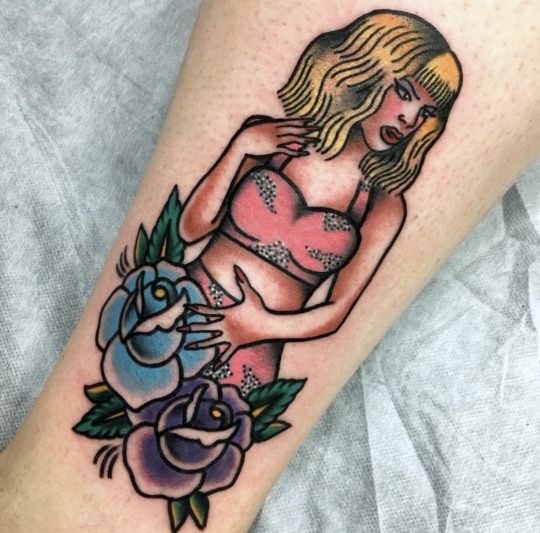
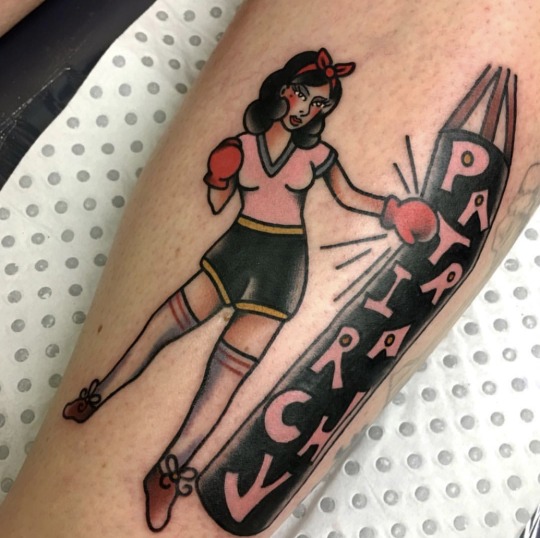
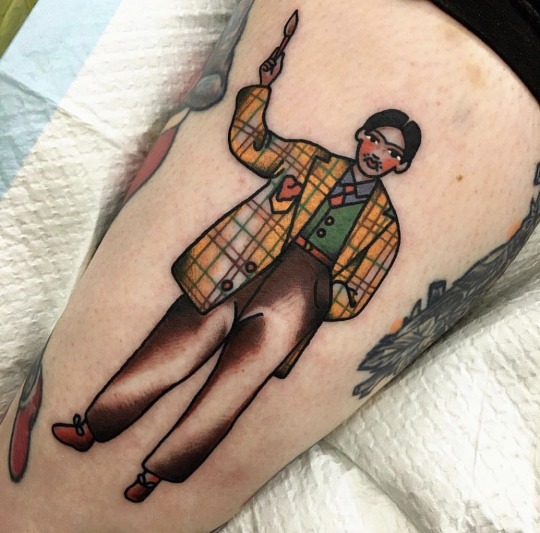
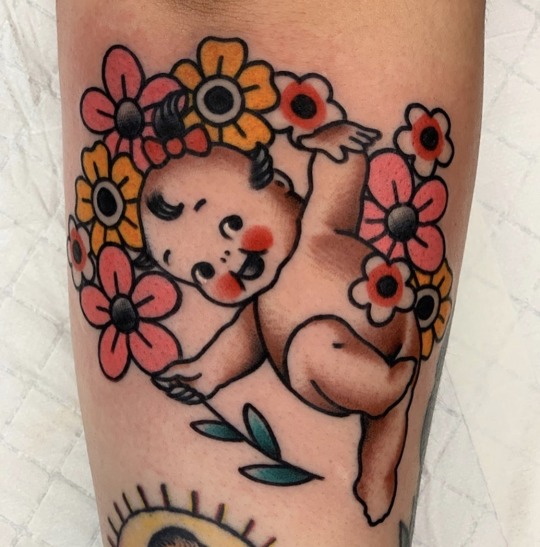
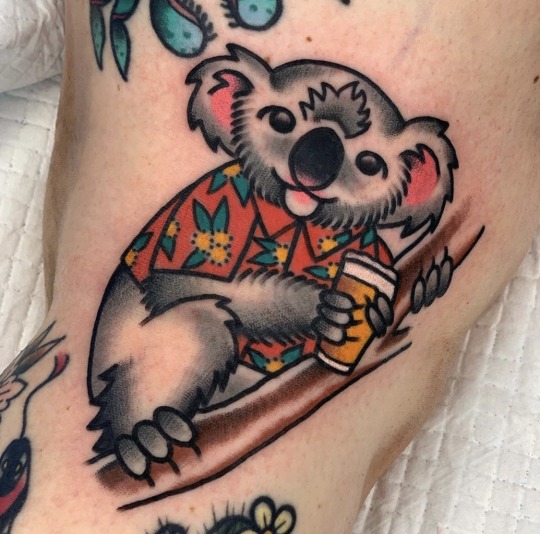
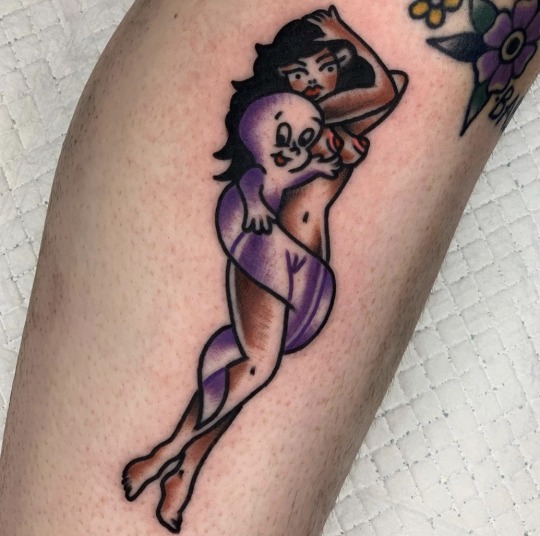

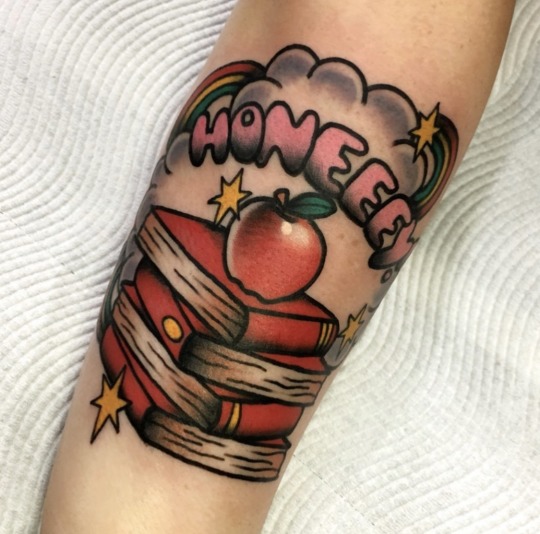
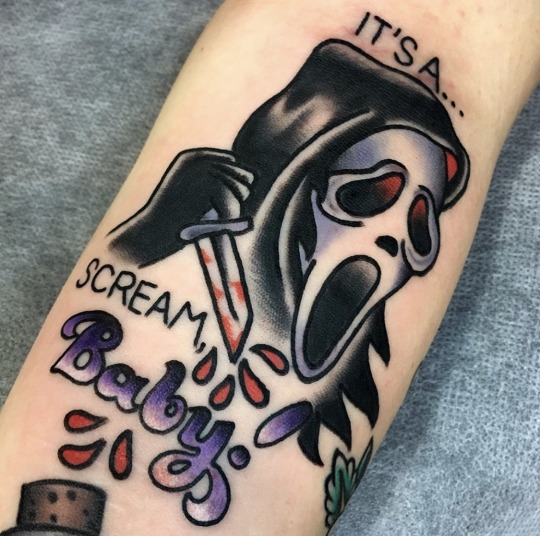
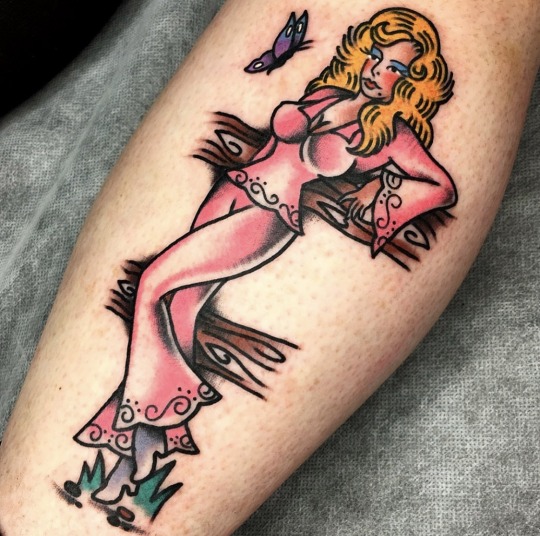
Courtney’s Tattoos
Tattoos by the fabulous Courtney (Miss Quartz) who I got to catch up with for the eleventh episode of the Not Jut A Girl podcast.
0 notes
Photo

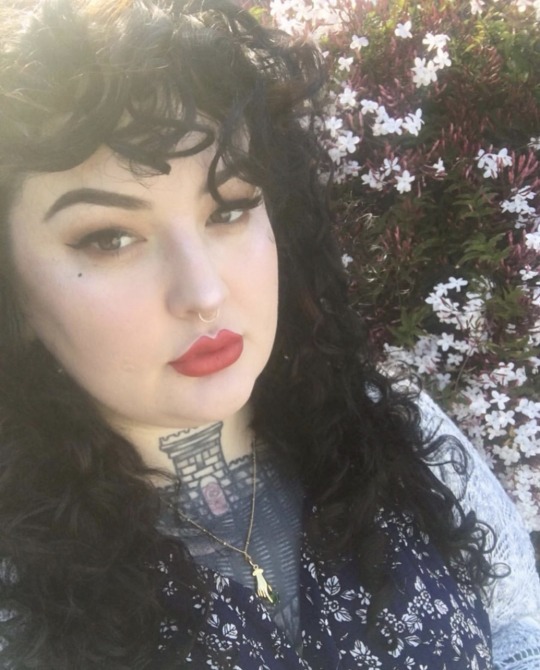
Miss Quartz
Introducing my eleventh guest on NOT JUST A GIRL: Tattoo Podcast, the wonderful Courtney who works at The Grand Illusion in Melbourne, VIC, Australia and you can listen to her episode here.
0 notes
Link
0 notes